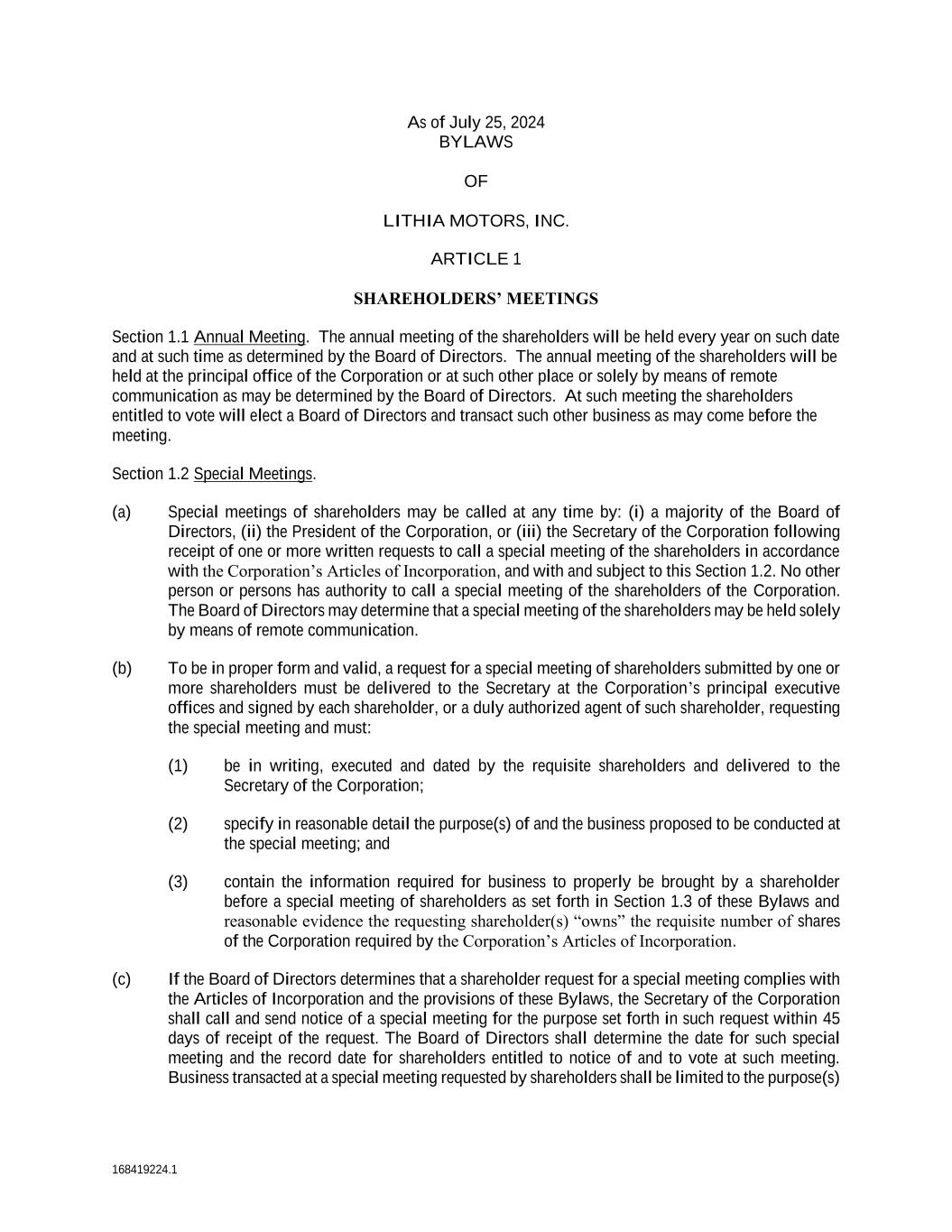
168419224.1 As of July 25, 2024 BYLAWS OF LITHIA MOTORS, INC. ARTICLE 1 SHAREHOLDERS’ MEETINGS Section 1.1 Annual Meeting. The annual meeting of the shareholders will be held every year on such date and at such time as determined by the Board of Directors. The annual meeting of the shareholders will be held at the principal office of the Corporation or at such other place or solely by means of remote communication as may be determined by the Board of Directors. At such meeting the shareholders entitled to vote will elect a Board of Directors and transact such other business as may come before the meeting. Section 1.2 Special Meetings. (a) Special meetings of shareholders may be called at any time by: (i) a majority of the Board of Directors, (ii) the President of the Corporation, or (iii) the Secretary of the Corporation following receipt of one or more written requests to call a special meeting of the shareholders in accordance with the Corporation’s Articles of Incorporation, and with and subject to this Section 1.2. No other person or persons has authority to call a special meeting of the shareholders of the Corporation. The Board of Directors may determine that a special meeting of the shareholders may be held solely by means of remote communication. (b) To be in proper form and valid, a request for a special meeting of shareholders submitted by one or more shareholders must be delivered to the Secretary at the Corporation’s principal executive offices and signed by each shareholder, or a duly authorized agent of such shareholder, requesting the special meeting and must: (1) be in writing, executed and dated by the requisite shareholders and delivered to the Secretary of the Corporation; (2) specify in reasonable detail the purpose(s) of and the business proposed to be conducted at the special meeting; and (3) contain the information required for business to properly be brought by a shareholder before a special meeting of shareholders as set forth in Section 1.3 of these Bylaws and reasonable evidence the requesting shareholder(s) “owns” the requisite number of shares of the Corporation required by the Corporation’s Articles of Incorporation. (c) If the Board of Directors determines that a shareholder request for a special meeting complies with the Articles of Incorporation and the provisions of these Bylaws, the Secretary of the Corporation shall call and send notice of a special meeting for the purpose set forth in such request within 45 days of receipt of the request. The Board of Directors shall determine the date for such special meeting and the record date for shareholders entitled to notice of and to vote at such meeting. Business transacted at a special meeting requested by shareholders shall be limited to the purpose(s)
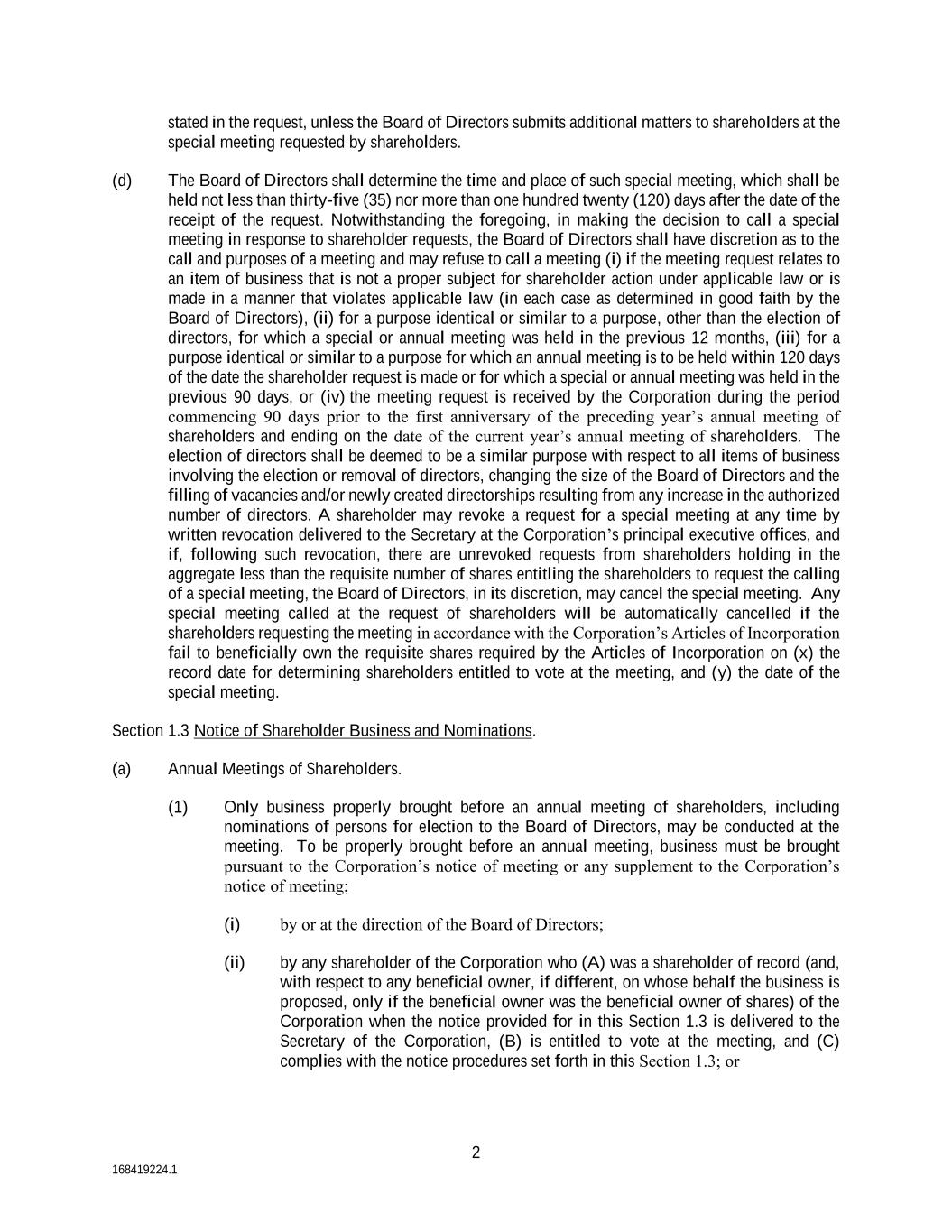
2 168419224.1 stated in the request, unless the Board of Directors submits additional matters to shareholders at the special meeting requested by shareholders. (d) The Board of Directors shall determine the time and place of such special meeting, which shall be held not less than thirty-five (35) nor more than one hundred twenty (120) days after the date of the receipt of the request. Notwithstanding the foregoing, in making the decision to call a special meeting in response to shareholder requests, the Board of Directors shall have discretion as to the call and purposes of a meeting and may refuse to call a meeting (i) if the meeting request relates to an item of business that is not a proper subject for shareholder action under applicable law or is made in a manner that violates applicable law (in each case as determined in good faith by the Board of Directors), (ii) for a purpose identical or similar to a purpose, other than the election of directors, for which a special or annual meeting was held in the previous 12 months, (iii) for a purpose identical or similar to a purpose for which an annual meeting is to be held within 120 days of the date the shareholder request is made or for which a special or annual meeting was held in the previous 90 days, or (iv) the meeting request is received by the Corporation during the period commencing 90 days prior to the first anniversary of the preceding year’s annual meeting of shareholders and ending on the date of the current year’s annual meeting of shareholders. The election of directors shall be deemed to be a similar purpose with respect to all items of business involving the election or removal of directors, changing the size of the Board of Directors and the filling of vacancies and/or newly created directorships resulting from any increase in the authorized number of directors. A shareholder may revoke a request for a special meeting at any time by written revocation delivered to the Secretary at the Corporation’s principal executive offices, and if, following such revocation, there are unrevoked requests from shareholders holding in the aggregate less than the requisite number of shares entitling the shareholders to request the calling of a special meeting, the Board of Directors, in its discretion, may cancel the special meeting. Any special meeting called at the request of shareholders will be automatically cancelled if the shareholders requesting the meeting in accordance with the Corporation’s Articles of Incorporation fail to beneficially own the requisite shares required by the Articles of Incorporation on (x) the record date for determining shareholders entitled to vote at the meeting, and (y) the date of the special meeting. Section 1.3 Notice of Shareholder Business and Nominations. (a) Annual Meetings of Shareholders. (1) Only business properly brought before an annual meeting of shareholders, including nominations of persons for election to the Board of Directors, may be conducted at the meeting. To be properly brought before an annual meeting, business must be brought pursuant to the Corporation’s notice of meeting or any supplement to the Corporation’s notice of meeting; (i) by or at the direction of the Board of Directors; (ii) by any shareholder of the Corporation who (A) was a shareholder of record (and, with respect to any beneficial owner, if different, on whose behalf the business is proposed, only if the beneficial owner was the beneficial owner of shares) of the Corporation when the notice provided for in this Section 1.3 is delivered to the Secretary of the Corporation, (B) is entitled to vote at the meeting, and (C) complies with the notice procedures set forth in this Section 1.3; or
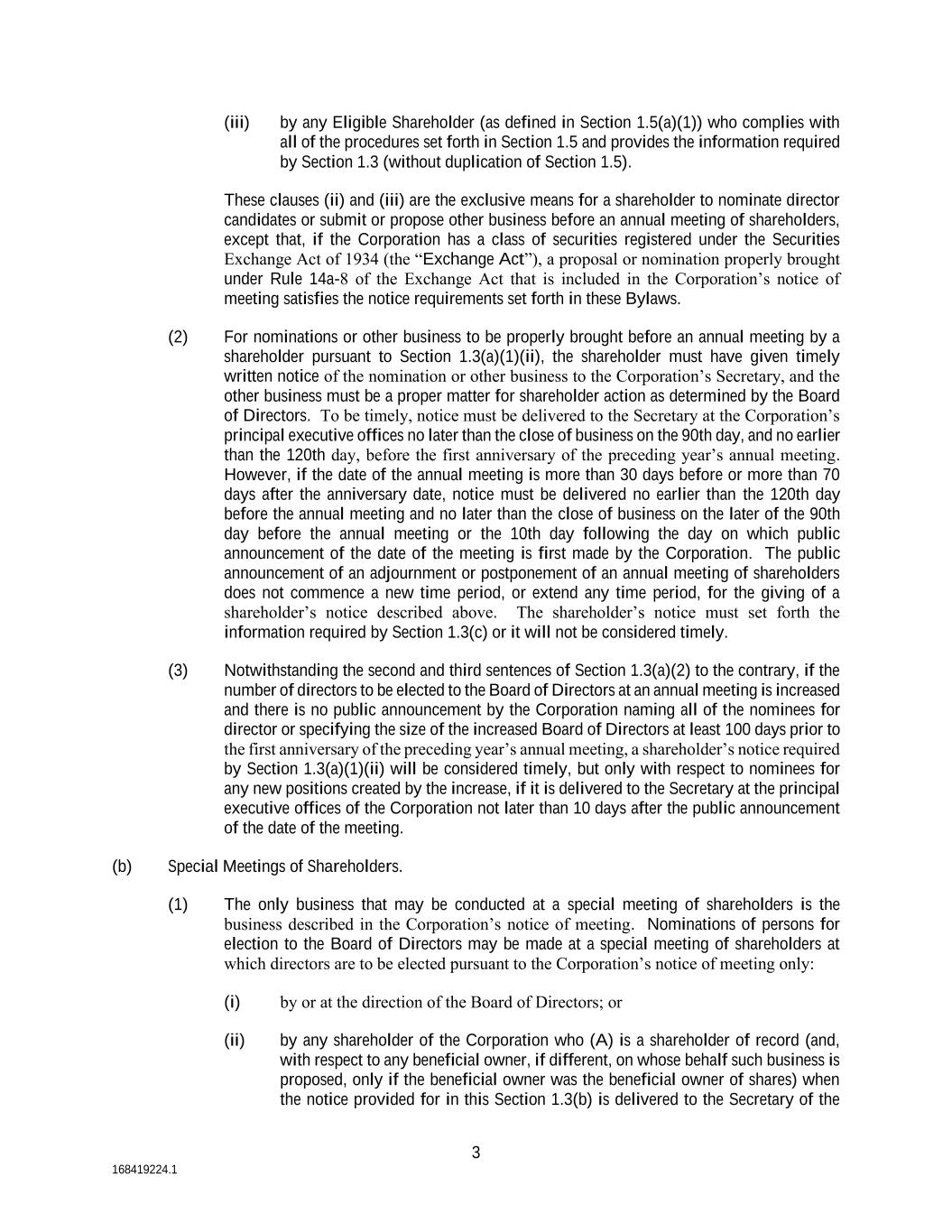
3 168419224.1 (iii) by any Eligible Shareholder (as defined in Section 1.5(a)(1)) who complies with all of the procedures set forth in Section 1.5 and provides the information required by Section 1.3 (without duplication of Section 1.5). These clauses (ii) and (iii) are the exclusive means for a shareholder to nominate director candidates or submit or propose other business before an annual meeting of shareholders, except that, if the Corporation has a class of securities registered under the Securities Exchange Act of 1934 (the “Exchange Act”), a proposal or nomination properly brought under Rule 14a-8 of the Exchange Act that is included in the Corporation’s notice of meeting satisfies the notice requirements set forth in these Bylaws. (2) For nominations or other business to be properly brought before an annual meeting by a shareholder pursuant to Section 1.3(a)(1)(ii), the shareholder must have given timely written notice of the nomination or other business to the Corporation’s Secretary, and the other business must be a proper matter for shareholder action as determined by the Board of Directors. To be timely, notice must be delivered to the Secretary at the Corporation’s principal executive offices no later than the close of business on the 90th day, and no earlier than the 120th day, before the first anniversary of the preceding year’s annual meeting. However, if the date of the annual meeting is more than 30 days before or more than 70 days after the anniversary date, notice must be delivered no earlier than the 120th day before the annual meeting and no later than the close of business on the later of the 90th day before the annual meeting or the 10th day following the day on which public announcement of the date of the meeting is first made by the Corporation. The public announcement of an adjournment or postponement of an annual meeting of shareholders does not commence a new time period, or extend any time period, for the giving of a shareholder’s notice described above. The shareholder’s notice must set forth the information required by Section 1.3(c) or it will not be considered timely. (3) Notwithstanding the second and third sentences of Section 1.3(a)(2) to the contrary, if the number of directors to be elected to the Board of Directors at an annual meeting is increased and there is no public announcement by the Corporation naming all of the nominees for director or specifying the size of the increased Board of Directors at least 100 days prior to the first anniversary of the preceding year’s annual meeting, a shareholder’s notice required by Section 1.3(a)(1)(ii) will be considered timely, but only with respect to nominees for any new positions created by the increase, if it is delivered to the Secretary at the principal executive offices of the Corporation not later than 10 days after the public announcement of the date of the meeting. (b) Special Meetings of Shareholders. (1) The only business that may be conducted at a special meeting of shareholders is the business described in the Corporation’s notice of meeting. Nominations of persons for election to the Board of Directors may be made at a special meeting of shareholders at which directors are to be elected pursuant to the Corporation’s notice of meeting only: (i) by or at the direction of the Board of Directors; or (ii) by any shareholder of the Corporation who (A) is a shareholder of record (and, with respect to any beneficial owner, if different, on whose behalf such business is proposed, only if the beneficial owner was the beneficial owner of shares) when the notice provided for in this Section 1.3(b) is delivered to the Secretary of the
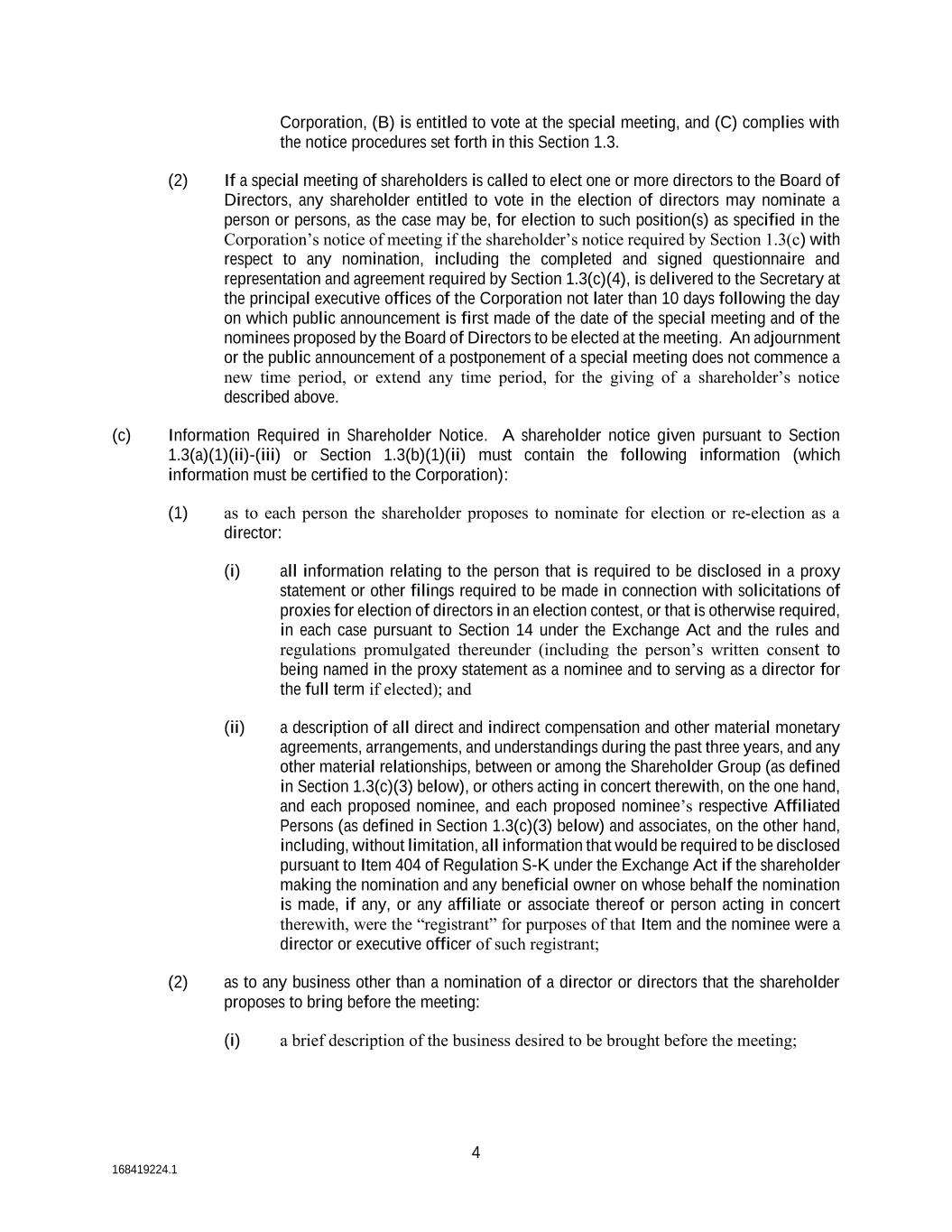
4 168419224.1 Corporation, (B) is entitled to vote at the special meeting, and (C) complies with the notice procedures set forth in this Section 1.3. (2) If a special meeting of shareholders is called to elect one or more directors to the Board of Directors, any shareholder entitled to vote in the election of directors may nominate a person or persons, as the case may be, for election to such position(s) as specified in the Corporation’s notice of meeting if the shareholder’s notice required by Section 1.3(c) with respect to any nomination, including the completed and signed questionnaire and representation and agreement required by Section 1.3(c)(4), is delivered to the Secretary at the principal executive offices of the Corporation not later than 10 days following the day on which public announcement is first made of the date of the special meeting and of the nominees proposed by the Board of Directors to be elected at the meeting. An adjournment or the public announcement of a postponement of a special meeting does not commence a new time period, or extend any time period, for the giving of a shareholder’s notice described above. (c) Information Required in Shareholder Notice. A shareholder notice given pursuant to Section 1.3(a)(1)(ii)-(iii) or Section 1.3(b)(1)(ii) must contain the following information (which information must be certified to the Corporation): (1) as to each person the shareholder proposes to nominate for election or re‑election as a director: (i) all information relating to the person that is required to be disclosed in a proxy statement or other filings required to be made in connection with solicitations of proxies for election of directors in an election contest, or that is otherwise required, in each case pursuant to Section 14 under the Exchange Act and the rules and regulations promulgated thereunder (including the person’s written consent to being named in the proxy statement as a nominee and to serving as a director for the full term if elected); and (ii) a description of all direct and indirect compensation and other material monetary agreements, arrangements, and understandings during the past three years, and any other material relationships, between or among the Shareholder Group (as defined in Section 1.3(c)(3) below), or others acting in concert therewith, on the one hand, and each proposed nominee, and each proposed nominee’s respective Affiliated Persons (as defined in Section 1.3(c)(3) below) and associates, on the other hand, including, without limitation, all information that would be required to be disclosed pursuant to Item 404 of Regulation S-K under the Exchange Act if the shareholder making the nomination and any beneficial owner on whose behalf the nomination is made, if any, or any affiliate or associate thereof or person acting in concert therewith, were the “registrant” for purposes of that Item and the nominee were a director or executive officer of such registrant; (2) as to any business other than a nomination of a director or directors that the shareholder proposes to bring before the meeting: (i) a brief description of the business desired to be brought before the meeting;
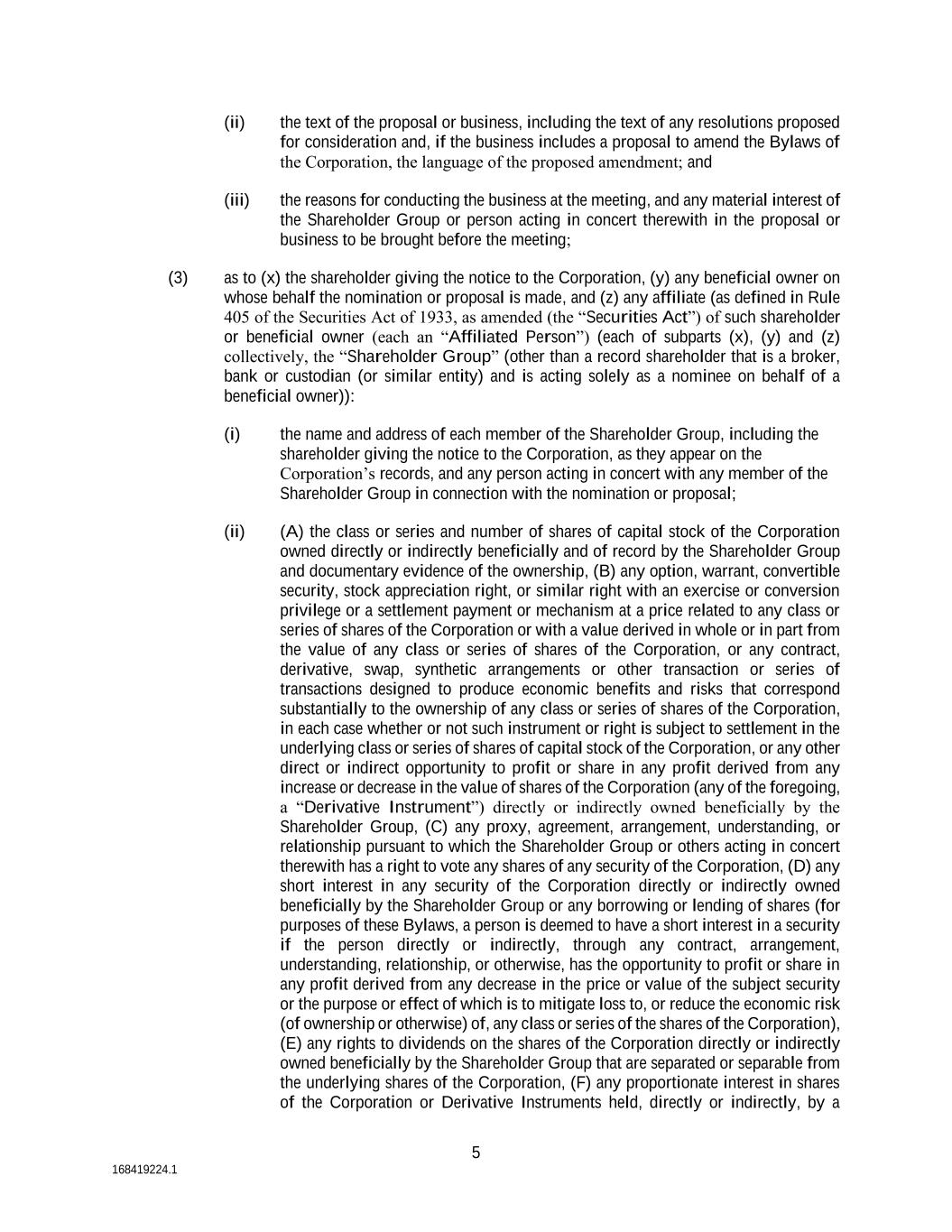
5 168419224.1 (ii) the text of the proposal or business, including the text of any resolutions proposed for consideration and, if the business includes a proposal to amend the Bylaws of the Corporation, the language of the proposed amendment; and (iii) the reasons for conducting the business at the meeting, and any material interest of the Shareholder Group or person acting in concert therewith in the proposal or business to be brought before the meeting; (3) as to (x) the shareholder giving the notice to the Corporation, (y) any beneficial owner on whose behalf the nomination or proposal is made, and (z) any affiliate (as defined in Rule 405 of the Securities Act of 1933, as amended (the “Securities Act”) of such shareholder or beneficial owner (each an “Affiliated Person”) (each of subparts (x), (y) and (z) collectively, the “Shareholder Group” (other than a record shareholder that is a broker, bank or custodian (or similar entity) and is acting solely as a nominee on behalf of a beneficial owner)): (i) the name and address of each member of the Shareholder Group, including the shareholder giving the notice to the Corporation, as they appear on the Corporation’s records, and any person acting in concert with any member of the Shareholder Group in connection with the nomination or proposal; (ii) (A) the class or series and number of shares of capital stock of the Corporation owned directly or indirectly beneficially and of record by the Shareholder Group and documentary evidence of the ownership, (B) any option, warrant, convertible security, stock appreciation right, or similar right with an exercise or conversion privilege or a settlement payment or mechanism at a price related to any class or series of shares of the Corporation or with a value derived in whole or in part from the value of any class or series of shares of the Corporation, or any contract, derivative, swap, synthetic arrangements or other transaction or series of transactions designed to produce economic benefits and risks that correspond substantially to the ownership of any class or series of shares of the Corporation, in each case whether or not such instrument or right is subject to settlement in the underlying class or series of shares of capital stock of the Corporation, or any other direct or indirect opportunity to profit or share in any profit derived from any increase or decrease in the value of shares of the Corporation (any of the foregoing, a “Derivative Instrument”) directly or indirectly owned beneficially by the Shareholder Group, (C) any proxy, agreement, arrangement, understanding, or relationship pursuant to which the Shareholder Group or others acting in concert therewith has a right to vote any shares of any security of the Corporation, (D) any short interest in any security of the Corporation directly or indirectly owned beneficially by the Shareholder Group or any borrowing or lending of shares (for purposes of these Bylaws, a person is deemed to have a short interest in a security if the person directly or indirectly, through any contract, arrangement, understanding, relationship, or otherwise, has the opportunity to profit or share in any profit derived from any decrease in the price or value of the subject security or the purpose or effect of which is to mitigate loss to, or reduce the economic risk (of ownership or otherwise) of, any class or series of the shares of the Corporation), (E) any rights to dividends on the shares of the Corporation directly or indirectly owned beneficially by the Shareholder Group that are separated or separable from the underlying shares of the Corporation, (F) any proportionate interest in shares of the Corporation or Derivative Instruments held, directly or indirectly, by a
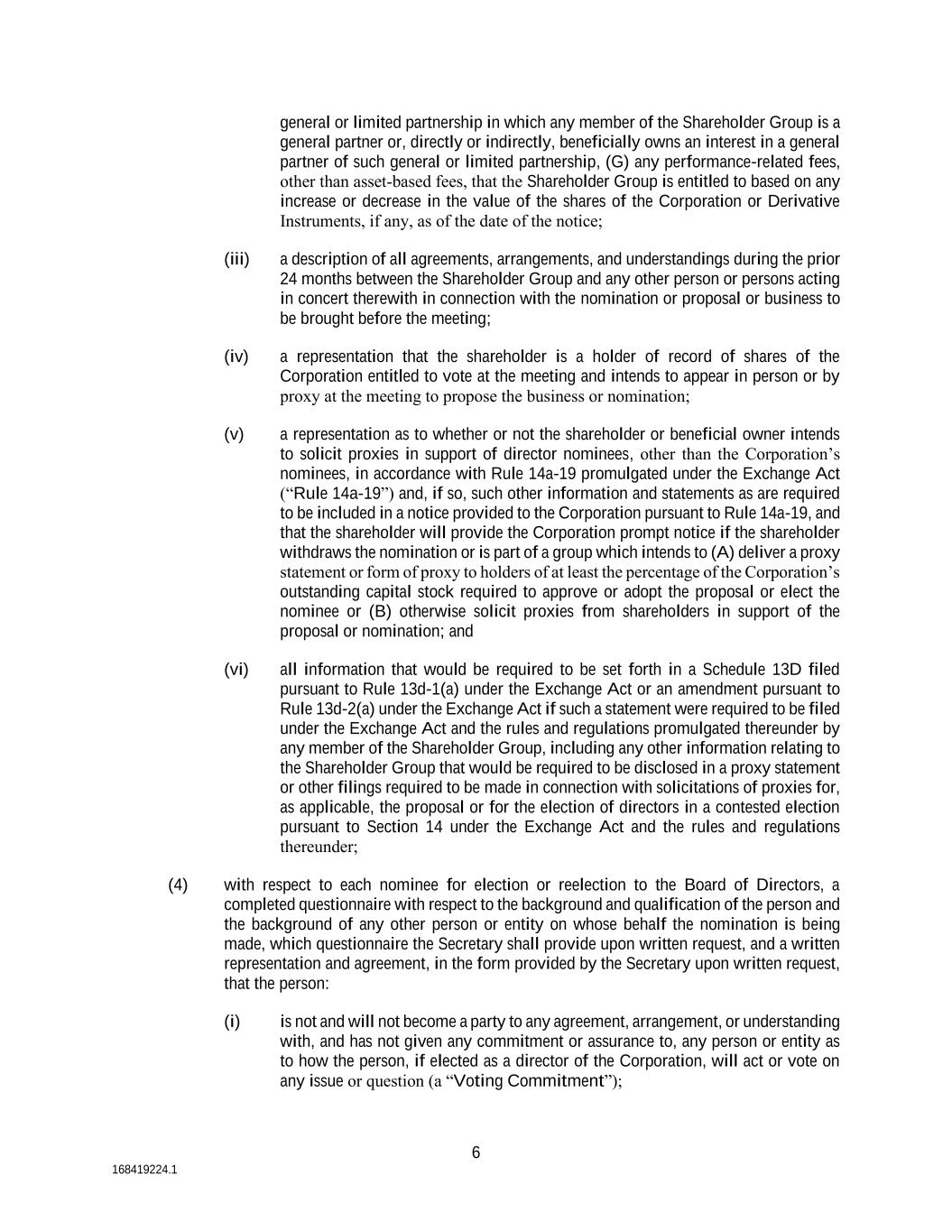
6 168419224.1 general or limited partnership in which any member of the Shareholder Group is a general partner or, directly or indirectly, beneficially owns an interest in a general partner of such general or limited partnership, (G) any performance-related fees, other than asset‑based fees, that the Shareholder Group is entitled to based on any increase or decrease in the value of the shares of the Corporation or Derivative Instruments, if any, as of the date of the notice; (iii) a description of all agreements, arrangements, and understandings during the prior 24 months between the Shareholder Group and any other person or persons acting in concert therewith in connection with the nomination or proposal or business to be brought before the meeting; (iv) a representation that the shareholder is a holder of record of shares of the Corporation entitled to vote at the meeting and intends to appear in person or by proxy at the meeting to propose the business or nomination; (v) a representation as to whether or not the shareholder or beneficial owner intends to solicit proxies in support of director nominees, other than the Corporation’s nominees, in accordance with Rule 14a-19 promulgated under the Exchange Act (“Rule 14a-19”) and, if so, such other information and statements as are required to be included in a notice provided to the Corporation pursuant to Rule 14a-19, and that the shareholder will provide the Corporation prompt notice if the shareholder withdraws the nomination or is part of a group which intends to (A) deliver a proxy statement or form of proxy to holders of at least the percentage of the Corporation’s outstanding capital stock required to approve or adopt the proposal or elect the nominee or (B) otherwise solicit proxies from shareholders in support of the proposal or nomination; and (vi) all information that would be required to be set forth in a Schedule 13D filed pursuant to Rule 13d-1(a) under the Exchange Act or an amendment pursuant to Rule 13d-2(a) under the Exchange Act if such a statement were required to be filed under the Exchange Act and the rules and regulations promulgated thereunder by any member of the Shareholder Group, including any other information relating to the Shareholder Group that would be required to be disclosed in a proxy statement or other filings required to be made in connection with solicitations of proxies for, as applicable, the proposal or for the election of directors in a contested election pursuant to Section 14 under the Exchange Act and the rules and regulations thereunder; (4) with respect to each nominee for election or reelection to the Board of Directors, a completed questionnaire with respect to the background and qualification of the person and the background of any other person or entity on whose behalf the nomination is being made, which questionnaire the Secretary shall provide upon written request, and a written representation and agreement, in the form provided by the Secretary upon written request, that the person: (i) is not and will not become a party to any agreement, arrangement, or understanding with, and has not given any commitment or assurance to, any person or entity as to how the person, if elected as a director of the Corporation, will act or vote on any issue or question (a “Voting Commitment”);
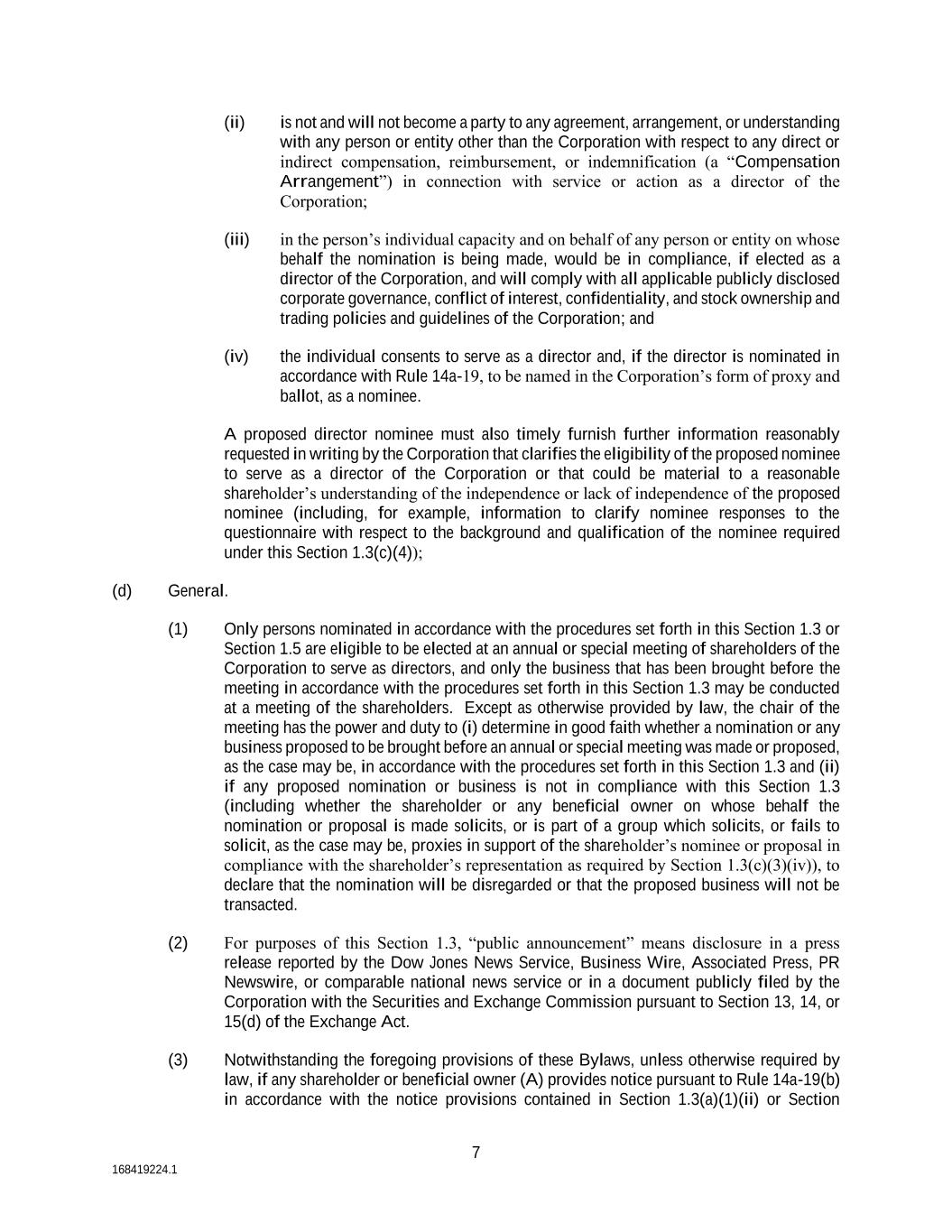
7 168419224.1 (ii) is not and will not become a party to any agreement, arrangement, or understanding with any person or entity other than the Corporation with respect to any direct or indirect compensation, reimbursement, or indemnification (a “Compensation Arrangement”) in connection with service or action as a director of the Corporation; (iii) in the person’s individual capacity and on behalf of any person or entity on whose behalf the nomination is being made, would be in compliance, if elected as a director of the Corporation, and will comply with all applicable publicly disclosed corporate governance, conflict of interest, confidentiality, and stock ownership and trading policies and guidelines of the Corporation; and (iv) the individual consents to serve as a director and, if the director is nominated in accordance with Rule 14a-19, to be named in the Corporation’s form of proxy and ballot, as a nominee. A proposed director nominee must also timely furnish further information reasonably requested in writing by the Corporation that clarifies the eligibility of the proposed nominee to serve as a director of the Corporation or that could be material to a reasonable shareholder’s understanding of the independence or lack of independence of the proposed nominee (including, for example, information to clarify nominee responses to the questionnaire with respect to the background and qualification of the nominee required under this Section 1.3(c)(4)); (d) General. (1) Only persons nominated in accordance with the procedures set forth in this Section 1.3 or Section 1.5 are eligible to be elected at an annual or special meeting of shareholders of the Corporation to serve as directors, and only the business that has been brought before the meeting in accordance with the procedures set forth in this Section 1.3 may be conducted at a meeting of the shareholders. Except as otherwise provided by law, the chair of the meeting has the power and duty to (i) determine in good faith whether a nomination or any business proposed to be brought before an annual or special meeting was made or proposed, as the case may be, in accordance with the procedures set forth in this Section 1.3 and (ii) if any proposed nomination or business is not in compliance with this Section 1.3 (including whether the shareholder or any beneficial owner on whose behalf the nomination or proposal is made solicits, or is part of a group which solicits, or fails to solicit, as the case may be, proxies in support of the shareholder’s nominee or proposal in compliance with the shareholder’s representation as required by Section 1.3(c)(3)(iv)), to declare that the nomination will be disregarded or that the proposed business will not be transacted. (2) For purposes of this Section 1.3, “public announcement” means disclosure in a press release reported by the Dow Jones News Service, Business Wire, Associated Press, PR Newswire, or comparable national news service or in a document publicly filed by the Corporation with the Securities and Exchange Commission pursuant to Section 13, 14, or 15(d) of the Exchange Act. (3) Notwithstanding the foregoing provisions of these Bylaws, unless otherwise required by law, if any shareholder or beneficial owner (A) provides notice pursuant to Rule 14a-19(b) in accordance with the notice provisions contained in Section 1.3(a)(1)(ii) or Section
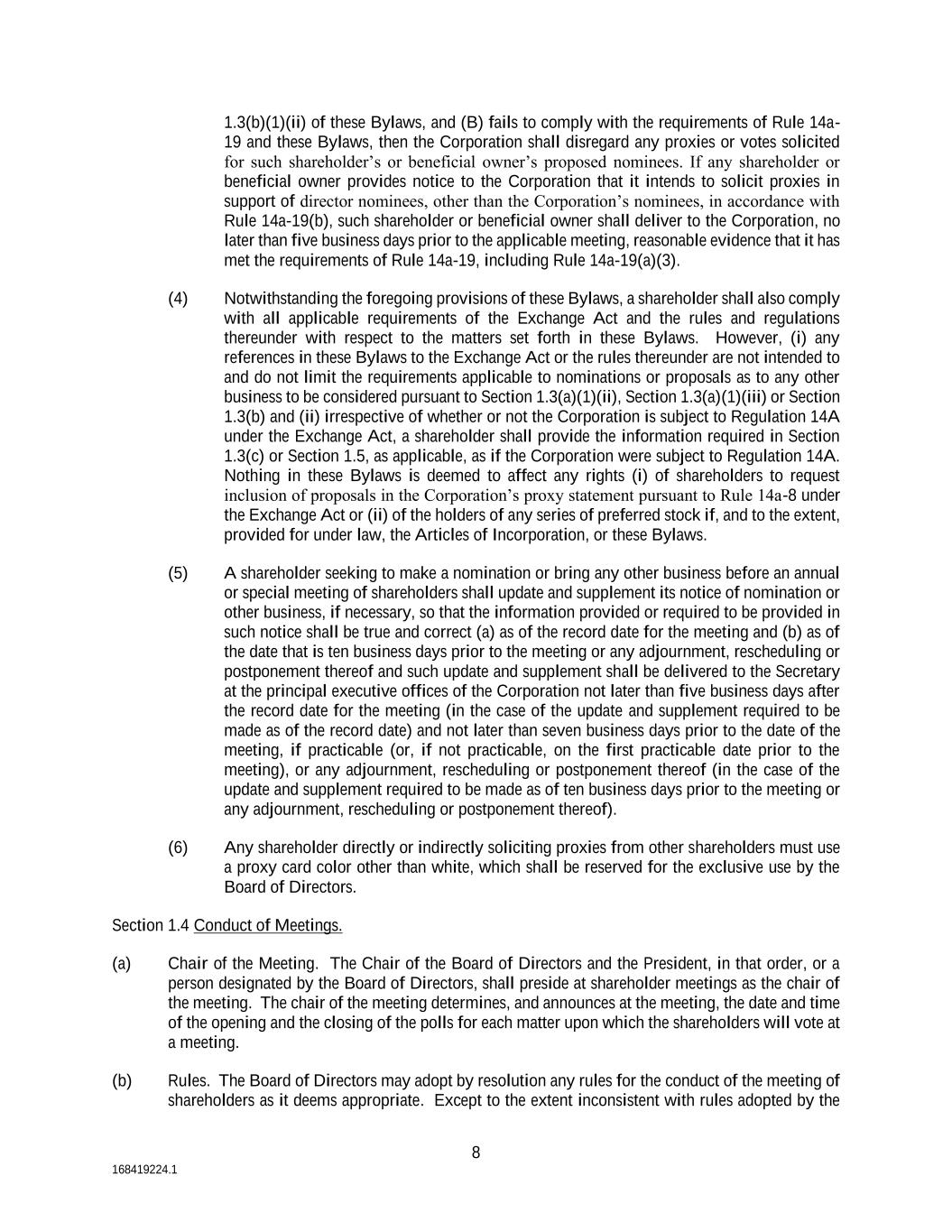
8 168419224.1 1.3(b)(1)(ii) of these Bylaws, and (B) fails to comply with the requirements of Rule 14a- 19 and these Bylaws, then the Corporation shall disregard any proxies or votes solicited for such shareholder’s or beneficial owner’s proposed nominees. If any shareholder or beneficial owner provides notice to the Corporation that it intends to solicit proxies in support of director nominees, other than the Corporation’s nominees, in accordance with Rule 14a-19(b), such shareholder or beneficial owner shall deliver to the Corporation, no later than five business days prior to the applicable meeting, reasonable evidence that it has met the requirements of Rule 14a-19, including Rule 14a-19(a)(3). (4) Notwithstanding the foregoing provisions of these Bylaws, a shareholder shall also comply with all applicable requirements of the Exchange Act and the rules and regulations thereunder with respect to the matters set forth in these Bylaws. However, (i) any references in these Bylaws to the Exchange Act or the rules thereunder are not intended to and do not limit the requirements applicable to nominations or proposals as to any other business to be considered pursuant to Section 1.3(a)(1)(ii), Section 1.3(a)(1)(iii) or Section 1.3(b) and (ii) irrespective of whether or not the Corporation is subject to Regulation 14A under the Exchange Act, a shareholder shall provide the information required in Section 1.3(c) or Section 1.5, as applicable, as if the Corporation were subject to Regulation 14A. Nothing in these Bylaws is deemed to affect any rights (i) of shareholders to request inclusion of proposals in the Corporation’s proxy statement pursuant to Rule 14a-8 under the Exchange Act or (ii) of the holders of any series of preferred stock if, and to the extent, provided for under law, the Articles of Incorporation, or these Bylaws. (5) A shareholder seeking to make a nomination or bring any other business before an annual or special meeting of shareholders shall update and supplement its notice of nomination or other business, if necessary, so that the information provided or required to be provided in such notice shall be true and correct (a) as of the record date for the meeting and (b) as of the date that is ten business days prior to the meeting or any adjournment, rescheduling or postponement thereof and such update and supplement shall be delivered to the Secretary at the principal executive offices of the Corporation not later than five business days after the record date for the meeting (in the case of the update and supplement required to be made as of the record date) and not later than seven business days prior to the date of the meeting, if practicable (or, if not practicable, on the first practicable date prior to the meeting), or any adjournment, rescheduling or postponement thereof (in the case of the update and supplement required to be made as of ten business days prior to the meeting or any adjournment, rescheduling or postponement thereof). (6) Any shareholder directly or indirectly soliciting proxies from other shareholders must use a proxy card color other than white, which shall be reserved for the exclusive use by the Board of Directors. Section 1.4 Conduct of Meetings. (a) Chair of the Meeting. The Chair of the Board of Directors and the President, in that order, or a person designated by the Board of Directors, shall preside at shareholder meetings as the chair of the meeting. The chair of the meeting determines, and announces at the meeting, the date and time of the opening and the closing of the polls for each matter upon which the shareholders will vote at a meeting. (b) Rules. The Board of Directors may adopt by resolution any rules for the conduct of the meeting of shareholders as it deems appropriate. Except to the extent inconsistent with rules adopted by the
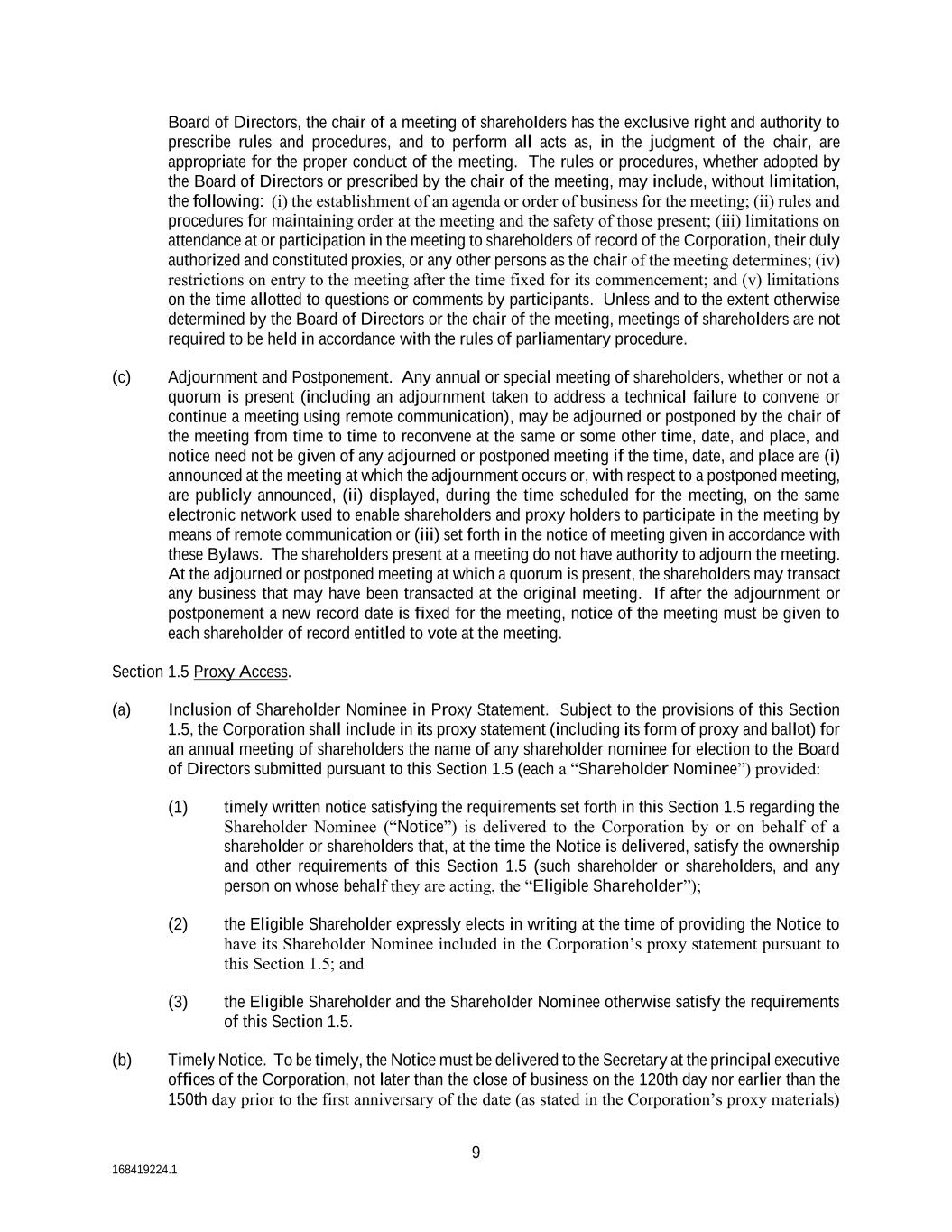
9 168419224.1 Board of Directors, the chair of a meeting of shareholders has the exclusive right and authority to prescribe rules and procedures, and to perform all acts as, in the judgment of the chair, are appropriate for the proper conduct of the meeting. The rules or procedures, whether adopted by the Board of Directors or prescribed by the chair of the meeting, may include, without limitation, the following: (i) the establishment of an agenda or order of business for the meeting; (ii) rules and procedures for maintaining order at the meeting and the safety of those present; (iii) limitations on attendance at or participation in the meeting to shareholders of record of the Corporation, their duly authorized and constituted proxies, or any other persons as the chair of the meeting determines; (iv) restrictions on entry to the meeting after the time fixed for its commencement; and (v) limitations on the time allotted to questions or comments by participants. Unless and to the extent otherwise determined by the Board of Directors or the chair of the meeting, meetings of shareholders are not required to be held in accordance with the rules of parliamentary procedure. (c) Adjournment and Postponement. Any annual or special meeting of shareholders, whether or not a quorum is present (including an adjournment taken to address a technical failure to convene or continue a meeting using remote communication), may be adjourned or postponed by the chair of the meeting from time to time to reconvene at the same or some other time, date, and place, and notice need not be given of any adjourned or postponed meeting if the time, date, and place are (i) announced at the meeting at which the adjournment occurs or, with respect to a postponed meeting, are publicly announced, (ii) displayed, during the time scheduled for the meeting, on the same electronic network used to enable shareholders and proxy holders to participate in the meeting by means of remote communication or (iii) set forth in the notice of meeting given in accordance with these Bylaws. The shareholders present at a meeting do not have authority to adjourn the meeting. At the adjourned or postponed meeting at which a quorum is present, the shareholders may transact any business that may have been transacted at the original meeting. If after the adjournment or postponement a new record date is fixed for the meeting, notice of the meeting must be given to each shareholder of record entitled to vote at the meeting. Section 1.5 Proxy Access. (a) Inclusion of Shareholder Nominee in Proxy Statement. Subject to the provisions of this Section 1.5, the Corporation shall include in its proxy statement (including its form of proxy and ballot) for an annual meeting of shareholders the name of any shareholder nominee for election to the Board of Directors submitted pursuant to this Section 1.5 (each a “Shareholder Nominee”) provided: (1) timely written notice satisfying the requirements set forth in this Section 1.5 regarding the Shareholder Nominee (“Notice”) is delivered to the Corporation by or on behalf of a shareholder or shareholders that, at the time the Notice is delivered, satisfy the ownership and other requirements of this Section 1.5 (such shareholder or shareholders, and any person on whose behalf they are acting, the “Eligible Shareholder”); (2) the Eligible Shareholder expressly elects in writing at the time of providing the Notice to have its Shareholder Nominee included in the Corporation’s proxy statement pursuant to this Section 1.5; and (3) the Eligible Shareholder and the Shareholder Nominee otherwise satisfy the requirements of this Section 1.5. (b) Timely Notice. To be timely, the Notice must be delivered to the Secretary at the principal executive offices of the Corporation, not later than the close of business on the 120th day nor earlier than the 150th day prior to the first anniversary of the date (as stated in the Corporation’s proxy materials)
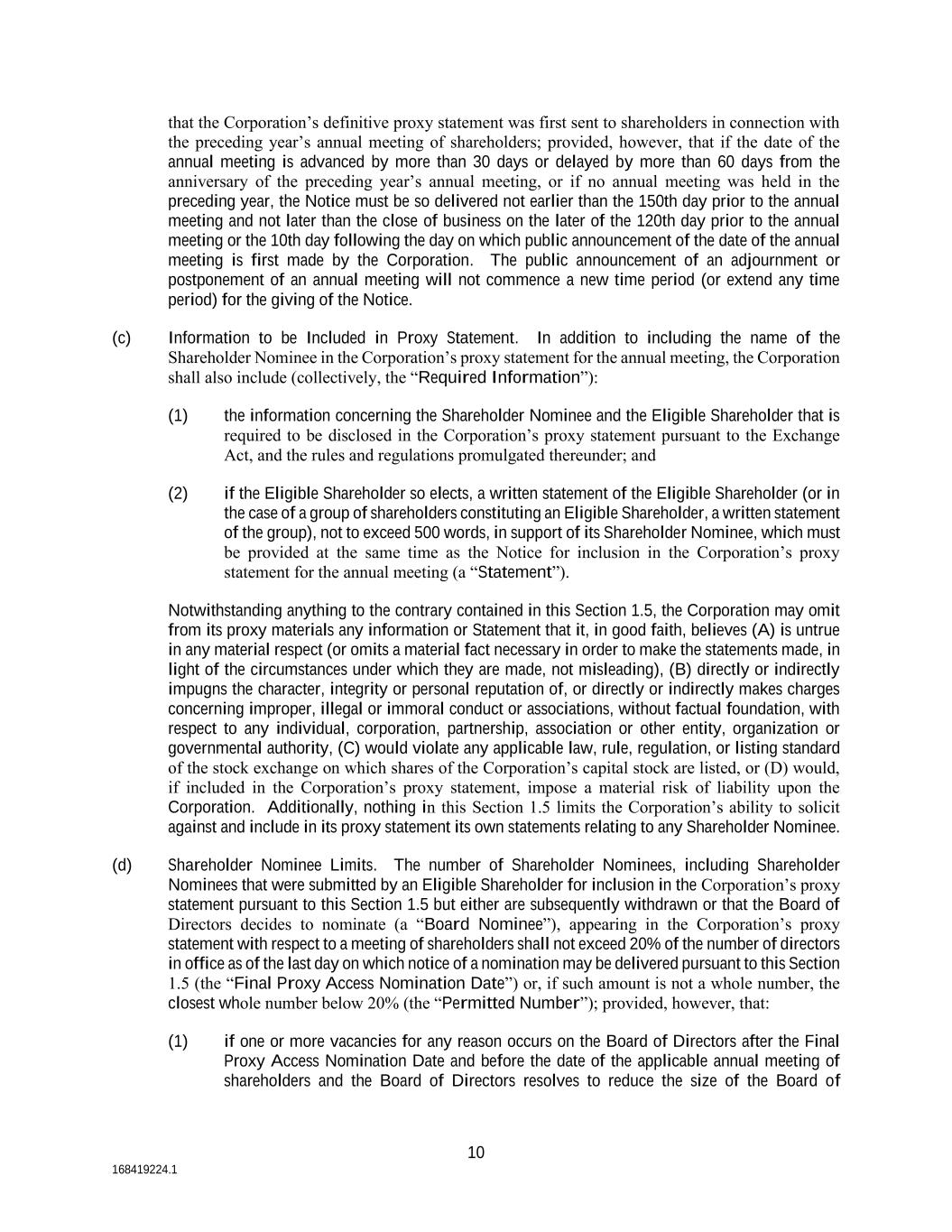
10 168419224.1 that the Corporation’s definitive proxy statement was first sent to shareholders in connection with the preceding year’s annual meeting of shareholders; provided, however, that if the date of the annual meeting is advanced by more than 30 days or delayed by more than 60 days from the anniversary of the preceding year’s annual meeting, or if no annual meeting was held in the preceding year, the Notice must be so delivered not earlier than the 150th day prior to the annual meeting and not later than the close of business on the later of the 120th day prior to the annual meeting or the 10th day following the day on which public announcement of the date of the annual meeting is first made by the Corporation. The public announcement of an adjournment or postponement of an annual meeting will not commence a new time period (or extend any time period) for the giving of the Notice. (c) Information to be Included in Proxy Statement. In addition to including the name of the Shareholder Nominee in the Corporation’s proxy statement for the annual meeting, the Corporation shall also include (collectively, the “Required Information”): (1) the information concerning the Shareholder Nominee and the Eligible Shareholder that is required to be disclosed in the Corporation’s proxy statement pursuant to the Exchange Act, and the rules and regulations promulgated thereunder; and (2) if the Eligible Shareholder so elects, a written statement of the Eligible Shareholder (or in the case of a group of shareholders constituting an Eligible Shareholder, a written statement of the group), not to exceed 500 words, in support of its Shareholder Nominee, which must be provided at the same time as the Notice for inclusion in the Corporation’s proxy statement for the annual meeting (a “Statement”). Notwithstanding anything to the contrary contained in this Section 1.5, the Corporation may omit from its proxy materials any information or Statement that it, in good faith, believes (A) is untrue in any material respect (or omits a material fact necessary in order to make the statements made, in light of the circumstances under which they are made, not misleading), (B) directly or indirectly impugns the character, integrity or personal reputation of, or directly or indirectly makes charges concerning improper, illegal or immoral conduct or associations, without factual foundation, with respect to any individual, corporation, partnership, association or other entity, organization or governmental authority, (C) would violate any applicable law, rule, regulation, or listing standard of the stock exchange on which shares of the Corporation’s capital stock are listed, or (D) would, if included in the Corporation’s proxy statement, impose a material risk of liability upon the Corporation. Additionally, nothing in this Section 1.5 limits the Corporation’s ability to solicit against and include in its proxy statement its own statements relating to any Shareholder Nominee. (d) Shareholder Nominee Limits. The number of Shareholder Nominees, including Shareholder Nominees that were submitted by an Eligible Shareholder for inclusion in the Corporation’s proxy statement pursuant to this Section 1.5 but either are subsequently withdrawn or that the Board of Directors decides to nominate (a “Board Nominee”), appearing in the Corporation’s proxy statement with respect to a meeting of shareholders shall not exceed 20% of the number of directors in office as of the last day on which notice of a nomination may be delivered pursuant to this Section 1.5 (the “Final Proxy Access Nomination Date”) or, if such amount is not a whole number, the closest whole number below 20% (the “Permitted Number”); provided, however, that: (1) if one or more vacancies for any reason occurs on the Board of Directors after the Final Proxy Access Nomination Date and before the date of the applicable annual meeting of shareholders and the Board of Directors resolves to reduce the size of the Board of
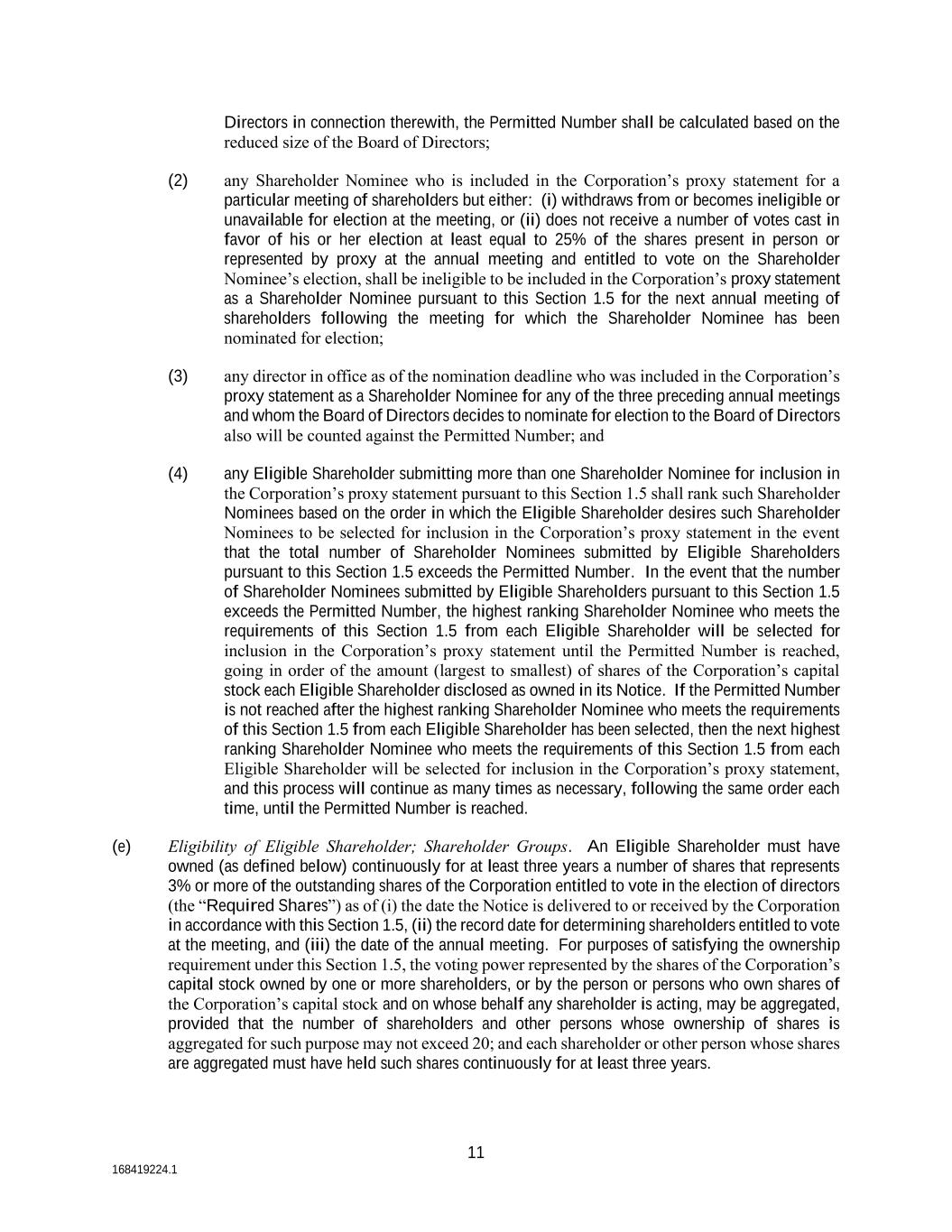
11 168419224.1 Directors in connection therewith, the Permitted Number shall be calculated based on the reduced size of the Board of Directors; (2) any Shareholder Nominee who is included in the Corporation’s proxy statement for a particular meeting of shareholders but either: (i) withdraws from or becomes ineligible or unavailable for election at the meeting, or (ii) does not receive a number of votes cast in favor of his or her election at least equal to 25% of the shares present in person or represented by proxy at the annual meeting and entitled to vote on the Shareholder Nominee’s election, shall be ineligible to be included in the Corporation’s proxy statement as a Shareholder Nominee pursuant to this Section 1.5 for the next annual meeting of shareholders following the meeting for which the Shareholder Nominee has been nominated for election; (3) any director in office as of the nomination deadline who was included in the Corporation’s proxy statement as a Shareholder Nominee for any of the three preceding annual meetings and whom the Board of Directors decides to nominate for election to the Board of Directors also will be counted against the Permitted Number; and (4) any Eligible Shareholder submitting more than one Shareholder Nominee for inclusion in the Corporation’s proxy statement pursuant to this Section 1.5 shall rank such Shareholder Nominees based on the order in which the Eligible Shareholder desires such Shareholder Nominees to be selected for inclusion in the Corporation’s proxy statement in the event that the total number of Shareholder Nominees submitted by Eligible Shareholders pursuant to this Section 1.5 exceeds the Permitted Number. In the event that the number of Shareholder Nominees submitted by Eligible Shareholders pursuant to this Section 1.5 exceeds the Permitted Number, the highest ranking Shareholder Nominee who meets the requirements of this Section 1.5 from each Eligible Shareholder will be selected for inclusion in the Corporation’s proxy statement until the Permitted Number is reached, going in order of the amount (largest to smallest) of shares of the Corporation’s capital stock each Eligible Shareholder disclosed as owned in its Notice. If the Permitted Number is not reached after the highest ranking Shareholder Nominee who meets the requirements of this Section 1.5 from each Eligible Shareholder has been selected, then the next highest ranking Shareholder Nominee who meets the requirements of this Section 1.5 from each Eligible Shareholder will be selected for inclusion in the Corporation’s proxy statement, and this process will continue as many times as necessary, following the same order each time, until the Permitted Number is reached. (e) Eligibility of Eligible Shareholder; Shareholder Groups. An Eligible Shareholder must have owned (as defined below) continuously for at least three years a number of shares that represents 3% or more of the outstanding shares of the Corporation entitled to vote in the election of directors (the “Required Shares”) as of (i) the date the Notice is delivered to or received by the Corporation in accordance with this Section 1.5, (ii) the record date for determining shareholders entitled to vote at the meeting, and (iii) the date of the annual meeting. For purposes of satisfying the ownership requirement under this Section 1.5, the voting power represented by the shares of the Corporation’s capital stock owned by one or more shareholders, or by the person or persons who own shares of the Corporation’s capital stock and on whose behalf any shareholder is acting, may be aggregated, provided that the number of shareholders and other persons whose ownership of shares is aggregated for such purpose may not exceed 20; and each shareholder or other person whose shares are aggregated must have held such shares continuously for at least three years.
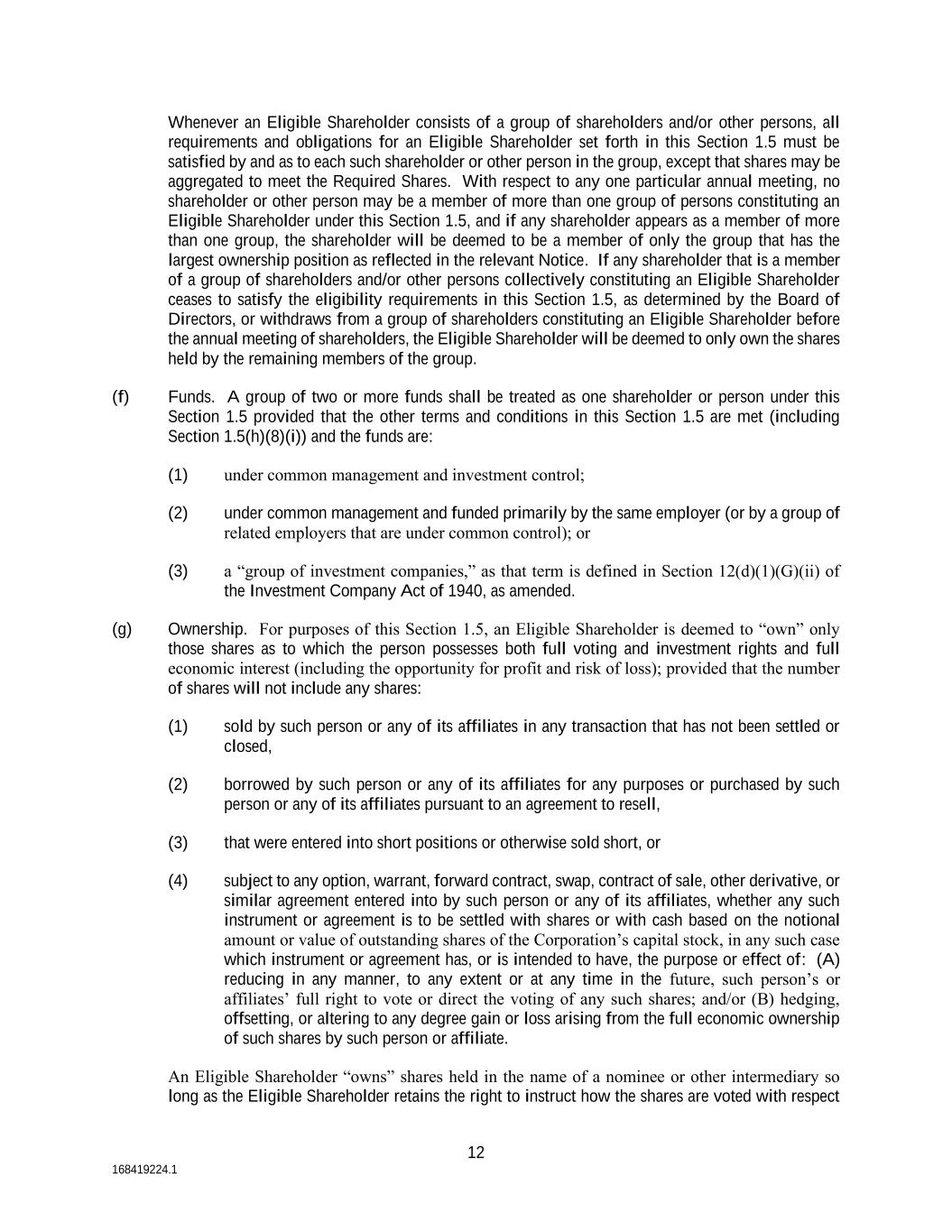
12 168419224.1 Whenever an Eligible Shareholder consists of a group of shareholders and/or other persons, all requirements and obligations for an Eligible Shareholder set forth in this Section 1.5 must be satisfied by and as to each such shareholder or other person in the group, except that shares may be aggregated to meet the Required Shares. With respect to any one particular annual meeting, no shareholder or other person may be a member of more than one group of persons constituting an Eligible Shareholder under this Section 1.5, and if any shareholder appears as a member of more than one group, the shareholder will be deemed to be a member of only the group that has the largest ownership position as reflected in the relevant Notice. If any shareholder that is a member of a group of shareholders and/or other persons collectively constituting an Eligible Shareholder ceases to satisfy the eligibility requirements in this Section 1.5, as determined by the Board of Directors, or withdraws from a group of shareholders constituting an Eligible Shareholder before the annual meeting of shareholders, the Eligible Shareholder will be deemed to only own the shares held by the remaining members of the group. (f) Funds. A group of two or more funds shall be treated as one shareholder or person under this Section 1.5 provided that the other terms and conditions in this Section 1.5 are met (including Section 1.5(h)(8)(i)) and the funds are: (1) under common management and investment control; (2) under common management and funded primarily by the same employer (or by a group of related employers that are under common control); or (3) a “group of investment companies,” as that term is defined in Section 12(d)(1)(G)(ii) of the Investment Company Act of 1940, as amended. (g) Ownership. For purposes of this Section 1.5, an Eligible Shareholder is deemed to “own” only those shares as to which the person possesses both full voting and investment rights and full economic interest (including the opportunity for profit and risk of loss); provided that the number of shares will not include any shares: (1) sold by such person or any of its affiliates in any transaction that has not been settled or closed, (2) borrowed by such person or any of its affiliates for any purposes or purchased by such person or any of its affiliates pursuant to an agreement to resell, (3) that were entered into short positions or otherwise sold short, or (4) subject to any option, warrant, forward contract, swap, contract of sale, other derivative, or similar agreement entered into by such person or any of its affiliates, whether any such instrument or agreement is to be settled with shares or with cash based on the notional amount or value of outstanding shares of the Corporation’s capital stock, in any such case which instrument or agreement has, or is intended to have, the purpose or effect of: (A) reducing in any manner, to any extent or at any time in the future, such person’s or affiliates’ full right to vote or direct the voting of any such shares; and/or (B) hedging, offsetting, or altering to any degree gain or loss arising from the full economic ownership of such shares by such person or affiliate. An Eligible Shareholder “owns” shares held in the name of a nominee or other intermediary so long as the Eligible Shareholder retains the right to instruct how the shares are voted with respect
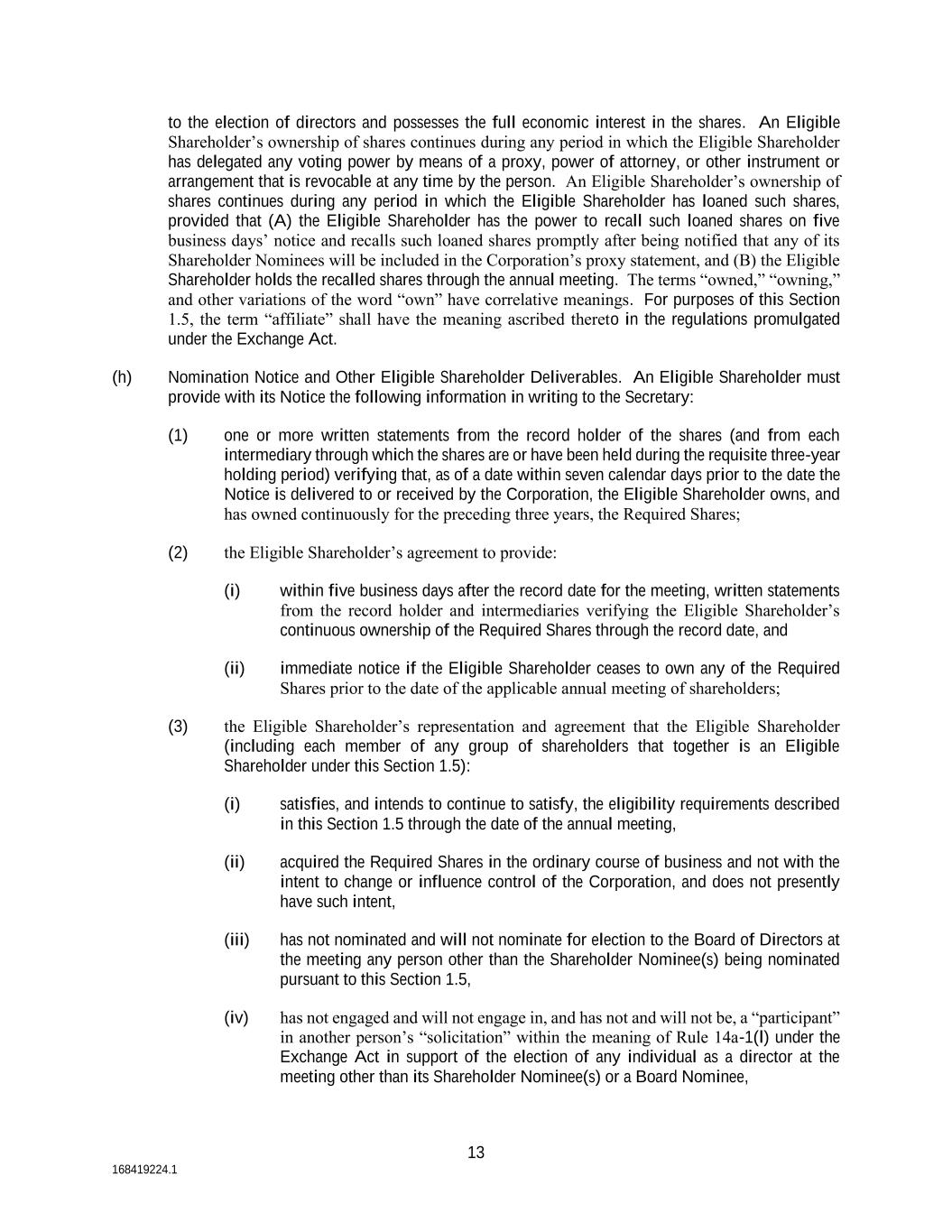
13 168419224.1 to the election of directors and possesses the full economic interest in the shares. An Eligible Shareholder’s ownership of shares continues during any period in which the Eligible Shareholder has delegated any voting power by means of a proxy, power of attorney, or other instrument or arrangement that is revocable at any time by the person. An Eligible Shareholder’s ownership of shares continues during any period in which the Eligible Shareholder has loaned such shares, provided that (A) the Eligible Shareholder has the power to recall such loaned shares on five business days’ notice and recalls such loaned shares promptly after being notified that any of its Shareholder Nominees will be included in the Corporation’s proxy statement, and (B) the Eligible Shareholder holds the recalled shares through the annual meeting. The terms “owned,” “owning,” and other variations of the word “own” have correlative meanings. For purposes of this Section 1.5, the term “affiliate” shall have the meaning ascribed thereto in the regulations promulgated under the Exchange Act. (h) Nomination Notice and Other Eligible Shareholder Deliverables. An Eligible Shareholder must provide with its Notice the following information in writing to the Secretary: (1) one or more written statements from the record holder of the shares (and from each intermediary through which the shares are or have been held during the requisite three-year holding period) verifying that, as of a date within seven calendar days prior to the date the Notice is delivered to or received by the Corporation, the Eligible Shareholder owns, and has owned continuously for the preceding three years, the Required Shares; (2) the Eligible Shareholder’s agreement to provide: (i) within five business days after the record date for the meeting, written statements from the record holder and intermediaries verifying the Eligible Shareholder’s continuous ownership of the Required Shares through the record date, and (ii) immediate notice if the Eligible Shareholder ceases to own any of the Required Shares prior to the date of the applicable annual meeting of shareholders; (3) the Eligible Shareholder’s representation and agreement that the Eligible Shareholder (including each member of any group of shareholders that together is an Eligible Shareholder under this Section 1.5): (i) satisfies, and intends to continue to satisfy, the eligibility requirements described in this Section 1.5 through the date of the annual meeting, (ii) acquired the Required Shares in the ordinary course of business and not with the intent to change or influence control of the Corporation, and does not presently have such intent, (iii) has not nominated and will not nominate for election to the Board of Directors at the meeting any person other than the Shareholder Nominee(s) being nominated pursuant to this Section 1.5, (iv) has not engaged and will not engage in, and has not and will not be, a “participant” in another person’s “solicitation” within the meaning of Rule 14a-1(l) under the Exchange Act in support of the election of any individual as a director at the meeting other than its Shareholder Nominee(s) or a Board Nominee,
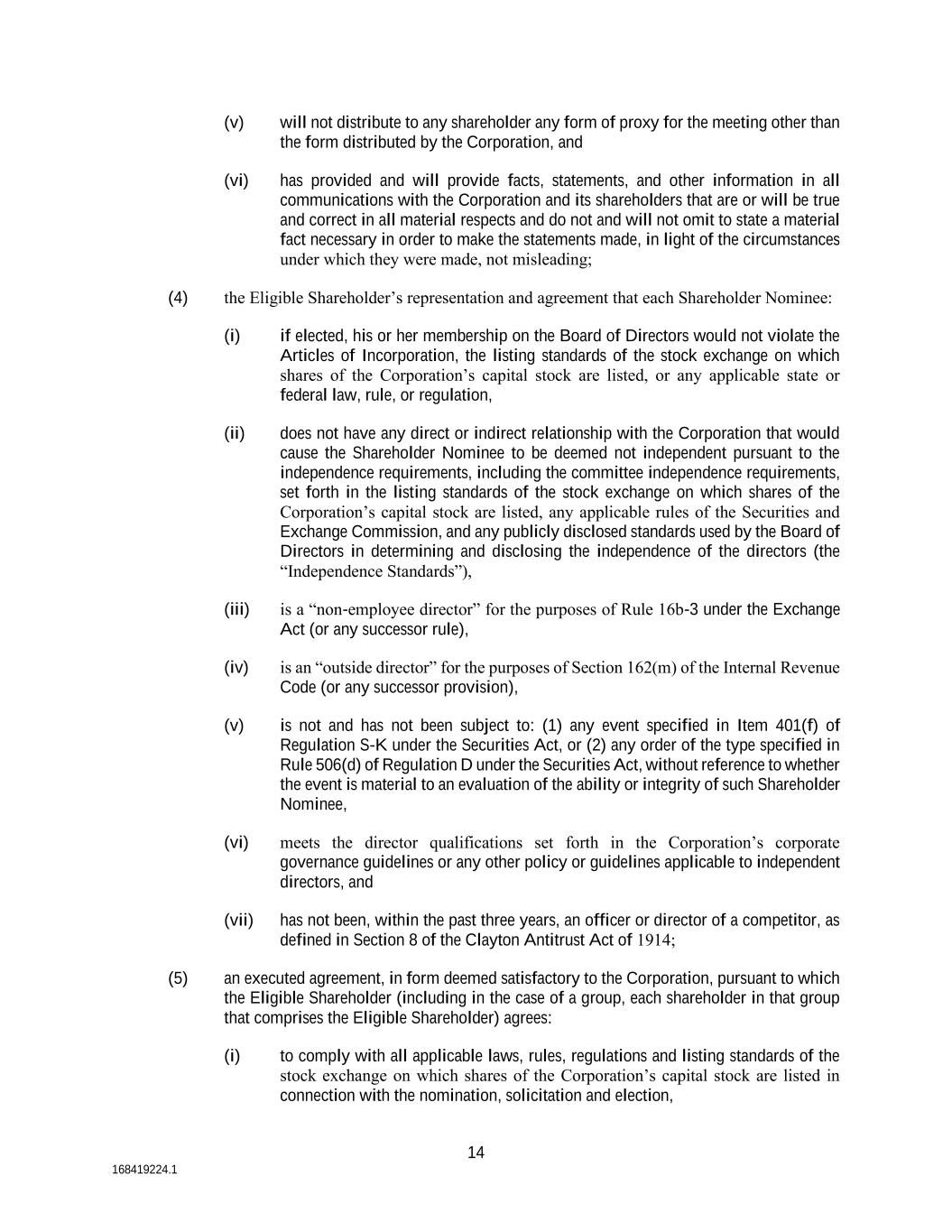
14 168419224.1 (v) will not distribute to any shareholder any form of proxy for the meeting other than the form distributed by the Corporation, and (vi) has provided and will provide facts, statements, and other information in all communications with the Corporation and its shareholders that are or will be true and correct in all material respects and do not and will not omit to state a material fact necessary in order to make the statements made, in light of the circumstances under which they were made, not misleading; (4) the Eligible Shareholder’s representation and agreement that each Shareholder Nominee: (i) if elected, his or her membership on the Board of Directors would not violate the Articles of Incorporation, the listing standards of the stock exchange on which shares of the Corporation’s capital stock are listed, or any applicable state or federal law, rule, or regulation, (ii) does not have any direct or indirect relationship with the Corporation that would cause the Shareholder Nominee to be deemed not independent pursuant to the independence requirements, including the committee independence requirements, set forth in the listing standards of the stock exchange on which shares of the Corporation’s capital stock are listed, any applicable rules of the Securities and Exchange Commission, and any publicly disclosed standards used by the Board of Directors in determining and disclosing the independence of the directors (the “Independence Standards”), (iii) is a “non-employee director” for the purposes of Rule 16b-3 under the Exchange Act (or any successor rule), (iv) is an “outside director” for the purposes of Section 162(m) of the Internal Revenue Code (or any successor provision), (v) is not and has not been subject to: (1) any event specified in Item 401(f) of Regulation S-K under the Securities Act, or (2) any order of the type specified in Rule 506(d) of Regulation D under the Securities Act, without reference to whether the event is material to an evaluation of the ability or integrity of such Shareholder Nominee, (vi) meets the director qualifications set forth in the Corporation’s corporate governance guidelines or any other policy or guidelines applicable to independent directors, and (vii) has not been, within the past three years, an officer or director of a competitor, as defined in Section 8 of the Clayton Antitrust Act of 1914; (5) an executed agreement, in form deemed satisfactory to the Corporation, pursuant to which the Eligible Shareholder (including in the case of a group, each shareholder in that group that comprises the Eligible Shareholder) agrees: (i) to comply with all applicable laws, rules, regulations and listing standards of the stock exchange on which shares of the Corporation’s capital stock are listed in connection with the nomination, solicitation and election,
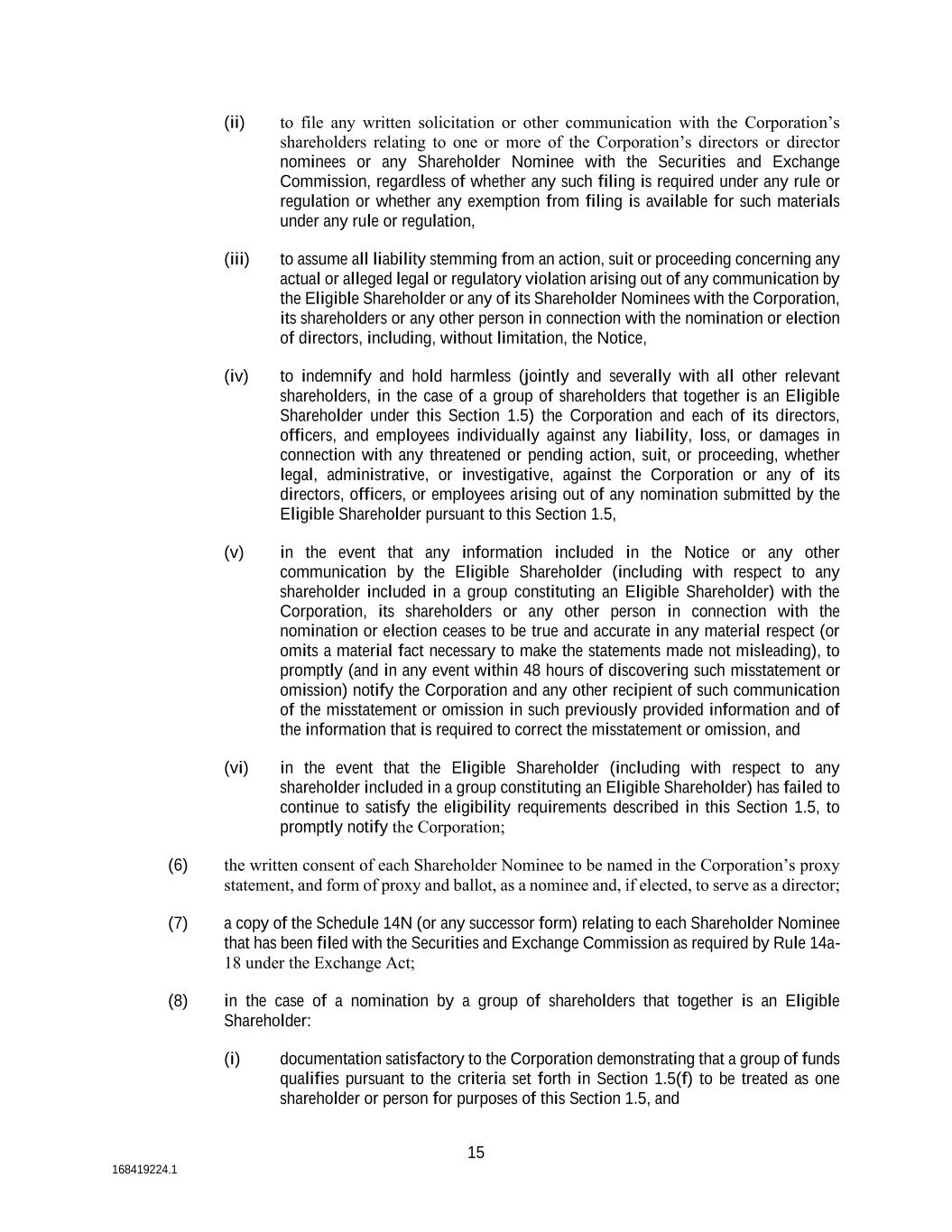
15 168419224.1 (ii) to file any written solicitation or other communication with the Corporation’s shareholders relating to one or more of the Corporation’s directors or director nominees or any Shareholder Nominee with the Securities and Exchange Commission, regardless of whether any such filing is required under any rule or regulation or whether any exemption from filing is available for such materials under any rule or regulation, (iii) to assume all liability stemming from an action, suit or proceeding concerning any actual or alleged legal or regulatory violation arising out of any communication by the Eligible Shareholder or any of its Shareholder Nominees with the Corporation, its shareholders or any other person in connection with the nomination or election of directors, including, without limitation, the Notice, (iv) to indemnify and hold harmless (jointly and severally with all other relevant shareholders, in the case of a group of shareholders that together is an Eligible Shareholder under this Section 1.5) the Corporation and each of its directors, officers, and employees individually against any liability, loss, or damages in connection with any threatened or pending action, suit, or proceeding, whether legal, administrative, or investigative, against the Corporation or any of its directors, officers, or employees arising out of any nomination submitted by the Eligible Shareholder pursuant to this Section 1.5, (v) in the event that any information included in the Notice or any other communication by the Eligible Shareholder (including with respect to any shareholder included in a group constituting an Eligible Shareholder) with the Corporation, its shareholders or any other person in connection with the nomination or election ceases to be true and accurate in any material respect (or omits a material fact necessary to make the statements made not misleading), to promptly (and in any event within 48 hours of discovering such misstatement or omission) notify the Corporation and any other recipient of such communication of the misstatement or omission in such previously provided information and of the information that is required to correct the misstatement or omission, and (vi) in the event that the Eligible Shareholder (including with respect to any shareholder included in a group constituting an Eligible Shareholder) has failed to continue to satisfy the eligibility requirements described in this Section 1.5, to promptly notify the Corporation; (6) the written consent of each Shareholder Nominee to be named in the Corporation’s proxy statement, and form of proxy and ballot, as a nominee and, if elected, to serve as a director; (7) a copy of the Schedule 14N (or any successor form) relating to each Shareholder Nominee that has been filed with the Securities and Exchange Commission as required by Rule 14a- 18 under the Exchange Act; (8) in the case of a nomination by a group of shareholders that together is an Eligible Shareholder: (i) documentation satisfactory to the Corporation demonstrating that a group of funds qualifies pursuant to the criteria set forth in Section 1.5(f) to be treated as one shareholder or person for purposes of this Section 1.5, and
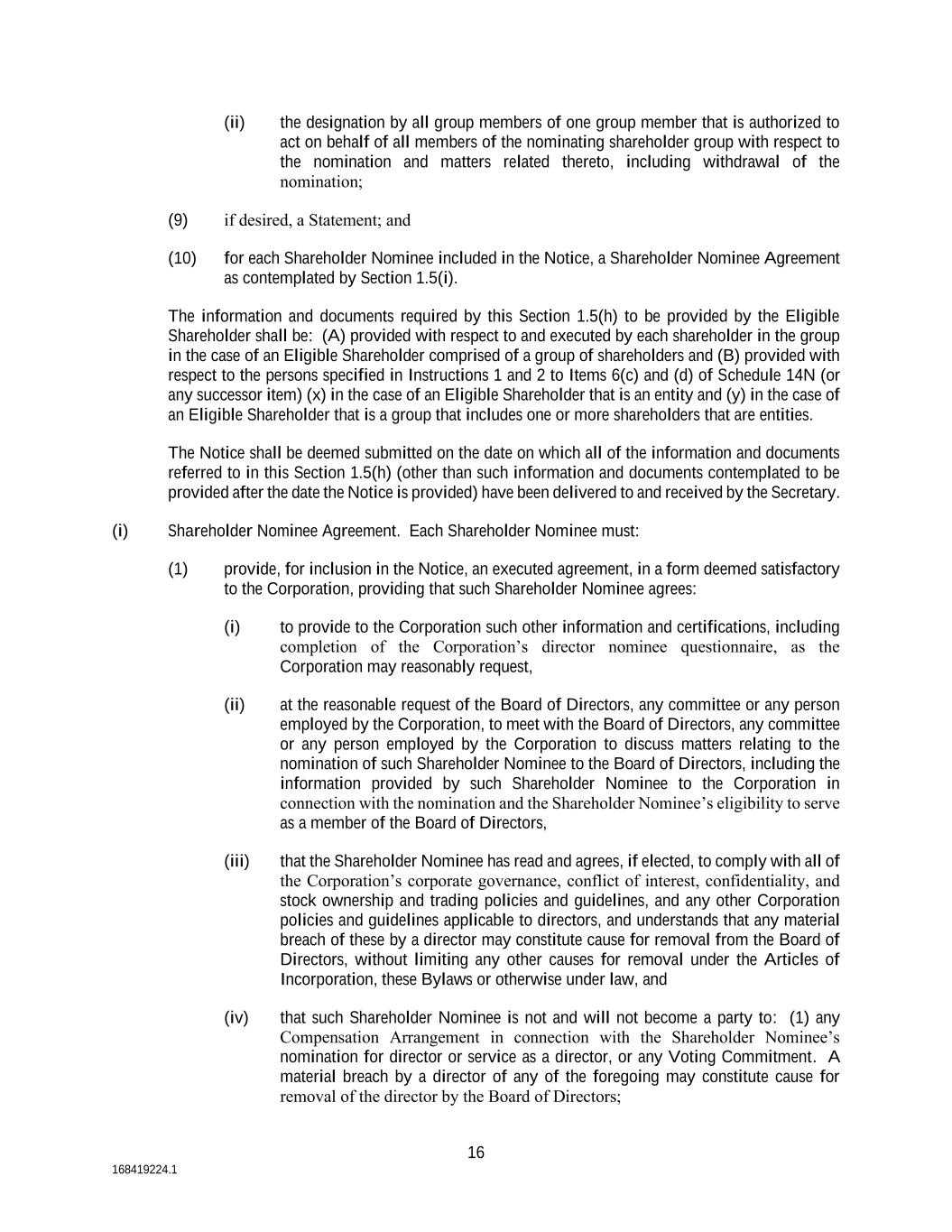
16 168419224.1 (ii) the designation by all group members of one group member that is authorized to act on behalf of all members of the nominating shareholder group with respect to the nomination and matters related thereto, including withdrawal of the nomination; (9) if desired, a Statement; and (10) for each Shareholder Nominee included in the Notice, a Shareholder Nominee Agreement as contemplated by Section 1.5(i). The information and documents required by this Section 1.5(h) to be provided by the Eligible Shareholder shall be: (A) provided with respect to and executed by each shareholder in the group in the case of an Eligible Shareholder comprised of a group of shareholders and (B) provided with respect to the persons specified in Instructions 1 and 2 to Items 6(c) and (d) of Schedule 14N (or any successor item) (x) in the case of an Eligible Shareholder that is an entity and (y) in the case of an Eligible Shareholder that is a group that includes one or more shareholders that are entities. The Notice shall be deemed submitted on the date on which all of the information and documents referred to in this Section 1.5(h) (other than such information and documents contemplated to be provided after the date the Notice is provided) have been delivered to and received by the Secretary. (i) Shareholder Nominee Agreement. Each Shareholder Nominee must: (1) provide, for inclusion in the Notice, an executed agreement, in a form deemed satisfactory to the Corporation, providing that such Shareholder Nominee agrees: (i) to provide to the Corporation such other information and certifications, including completion of the Corporation’s director nominee questionnaire, as the Corporation may reasonably request, (ii) at the reasonable request of the Board of Directors, any committee or any person employed by the Corporation, to meet with the Board of Directors, any committee or any person employed by the Corporation to discuss matters relating to the nomination of such Shareholder Nominee to the Board of Directors, including the information provided by such Shareholder Nominee to the Corporation in connection with the nomination and the Shareholder Nominee’s eligibility to serve as a member of the Board of Directors, (iii) that the Shareholder Nominee has read and agrees, if elected, to comply with all of the Corporation’s corporate governance, conflict of interest, confidentiality, and stock ownership and trading policies and guidelines, and any other Corporation policies and guidelines applicable to directors, and understands that any material breach of these by a director may constitute cause for removal from the Board of Directors, without limiting any other causes for removal under the Articles of Incorporation, these Bylaws or otherwise under law, and (iv) that such Shareholder Nominee is not and will not become a party to: (1) any Compensation Arrangement in connection with the Shareholder Nominee’s nomination for director or service as a director, or any Voting Commitment. A material breach by a director of any of the foregoing may constitute cause for removal of the director by the Board of Directors;
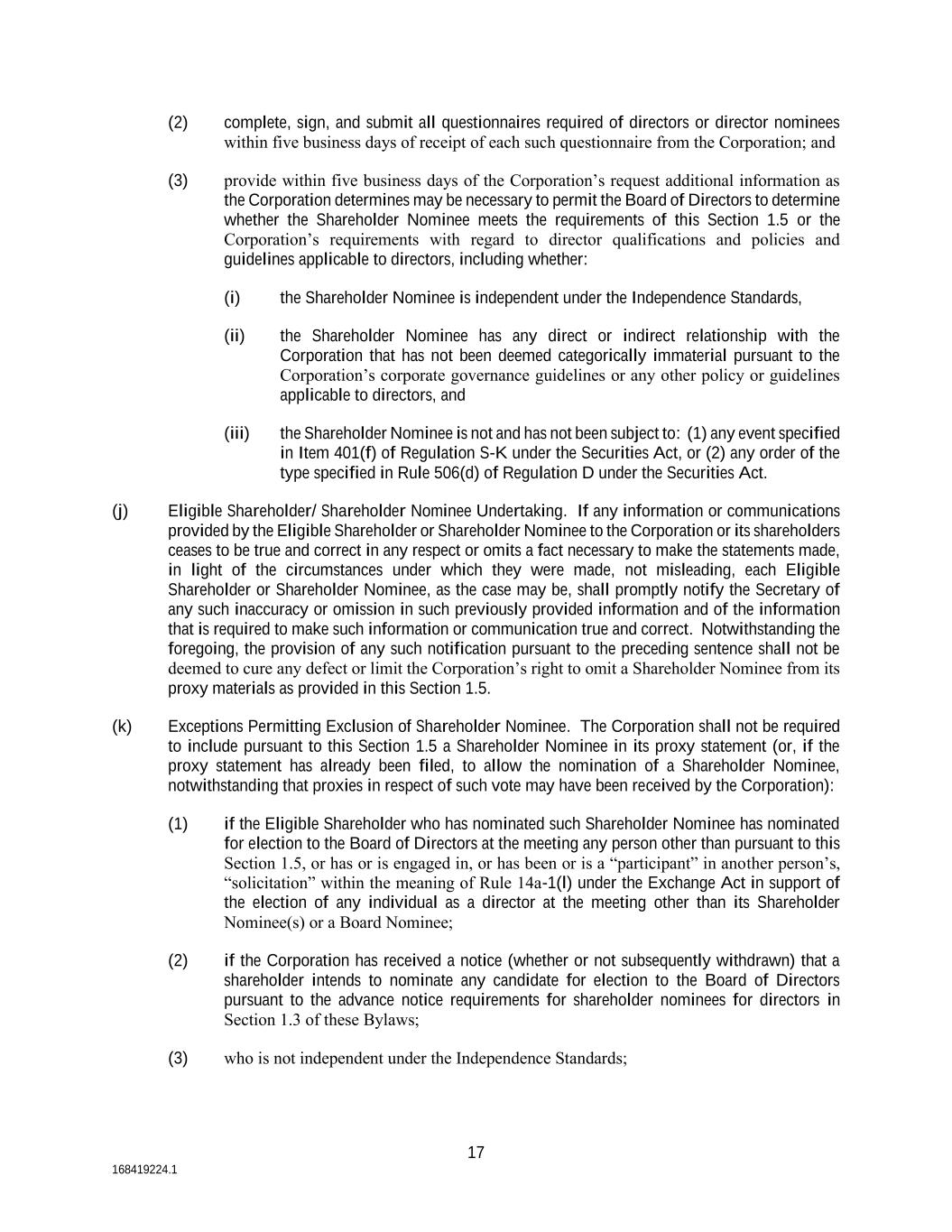
17 168419224.1 (2) complete, sign, and submit all questionnaires required of directors or director nominees within five business days of receipt of each such questionnaire from the Corporation; and (3) provide within five business days of the Corporation’s request additional information as the Corporation determines may be necessary to permit the Board of Directors to determine whether the Shareholder Nominee meets the requirements of this Section 1.5 or the Corporation’s requirements with regard to director qualifications and policies and guidelines applicable to directors, including whether: (i) the Shareholder Nominee is independent under the Independence Standards, (ii) the Shareholder Nominee has any direct or indirect relationship with the Corporation that has not been deemed categorically immaterial pursuant to the Corporation’s corporate governance guidelines or any other policy or guidelines applicable to directors, and (iii) the Shareholder Nominee is not and has not been subject to: (1) any event specified in Item 401(f) of Regulation S-K under the Securities Act, or (2) any order of the type specified in Rule 506(d) of Regulation D under the Securities Act. (j) Eligible Shareholder/ Shareholder Nominee Undertaking. If any information or communications provided by the Eligible Shareholder or Shareholder Nominee to the Corporation or its shareholders ceases to be true and correct in any respect or omits a fact necessary to make the statements made, in light of the circumstances under which they were made, not misleading, each Eligible Shareholder or Shareholder Nominee, as the case may be, shall promptly notify the Secretary of any such inaccuracy or omission in such previously provided information and of the information that is required to make such information or communication true and correct. Notwithstanding the foregoing, the provision of any such notification pursuant to the preceding sentence shall not be deemed to cure any defect or limit the Corporation’s right to omit a Shareholder Nominee from its proxy materials as provided in this Section 1.5. (k) Exceptions Permitting Exclusion of Shareholder Nominee. The Corporation shall not be required to include pursuant to this Section 1.5 a Shareholder Nominee in its proxy statement (or, if the proxy statement has already been filed, to allow the nomination of a Shareholder Nominee, notwithstanding that proxies in respect of such vote may have been received by the Corporation): (1) if the Eligible Shareholder who has nominated such Shareholder Nominee has nominated for election to the Board of Directors at the meeting any person other than pursuant to this Section 1.5, or has or is engaged in, or has been or is a “participant” in another person’s, “solicitation” within the meaning of Rule 14a-1(l) under the Exchange Act in support of the election of any individual as a director at the meeting other than its Shareholder Nominee(s) or a Board Nominee; (2) if the Corporation has received a notice (whether or not subsequently withdrawn) that a shareholder intends to nominate any candidate for election to the Board of Directors pursuant to the advance notice requirements for shareholder nominees for directors in Section 1.3 of these Bylaws; (3) who is not independent under the Independence Standards;
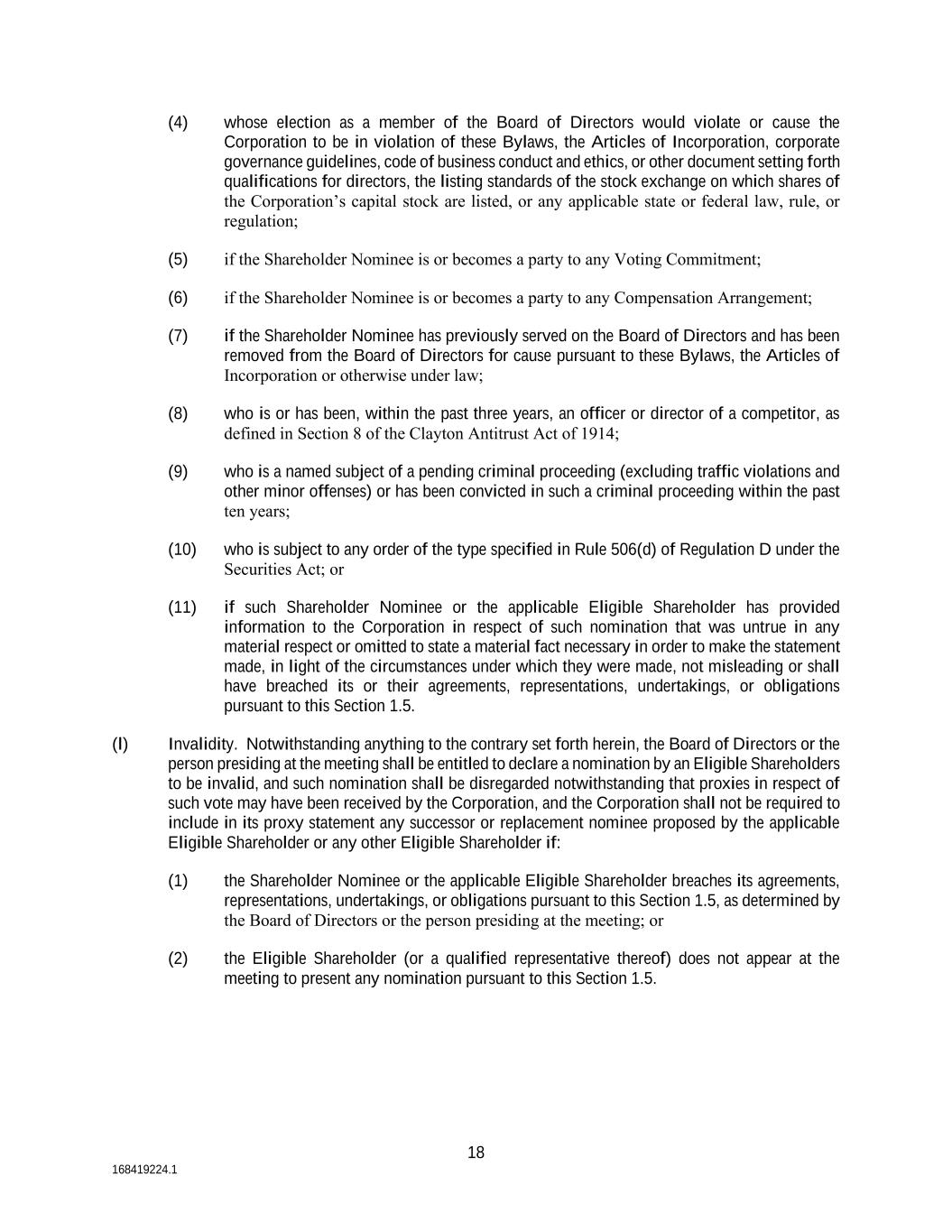
18 168419224.1 (4) whose election as a member of the Board of Directors would violate or cause the Corporation to be in violation of these Bylaws, the Articles of Incorporation, corporate governance guidelines, code of business conduct and ethics, or other document setting forth qualifications for directors, the listing standards of the stock exchange on which shares of the Corporation’s capital stock are listed, or any applicable state or federal law, rule, or regulation; (5) if the Shareholder Nominee is or becomes a party to any Voting Commitment; (6) if the Shareholder Nominee is or becomes a party to any Compensation Arrangement; (7) if the Shareholder Nominee has previously served on the Board of Directors and has been removed from the Board of Directors for cause pursuant to these Bylaws, the Articles of Incorporation or otherwise under law; (8) who is or has been, within the past three years, an officer or director of a competitor, as defined in Section 8 of the Clayton Antitrust Act of 1914; (9) who is a named subject of a pending criminal proceeding (excluding traffic violations and other minor offenses) or has been convicted in such a criminal proceeding within the past ten years; (10) who is subject to any order of the type specified in Rule 506(d) of Regulation D under the Securities Act; or (11) if such Shareholder Nominee or the applicable Eligible Shareholder has provided information to the Corporation in respect of such nomination that was untrue in any material respect or omitted to state a material fact necessary in order to make the statement made, in light of the circumstances under which they were made, not misleading or shall have breached its or their agreements, representations, undertakings, or obligations pursuant to this Section 1.5. (l) Invalidity. Notwithstanding anything to the contrary set forth herein, the Board of Directors or the person presiding at the meeting shall be entitled to declare a nomination by an Eligible Shareholders to be invalid, and such nomination shall be disregarded notwithstanding that proxies in respect of such vote may have been received by the Corporation, and the Corporation shall not be required to include in its proxy statement any successor or replacement nominee proposed by the applicable Eligible Shareholder or any other Eligible Shareholder if: (1) the Shareholder Nominee or the applicable Eligible Shareholder breaches its agreements, representations, undertakings, or obligations pursuant to this Section 1.5, as determined by the Board of Directors or the person presiding at the meeting; or (2) the Eligible Shareholder (or a qualified representative thereof) does not appear at the meeting to present any nomination pursuant to this Section 1.5.
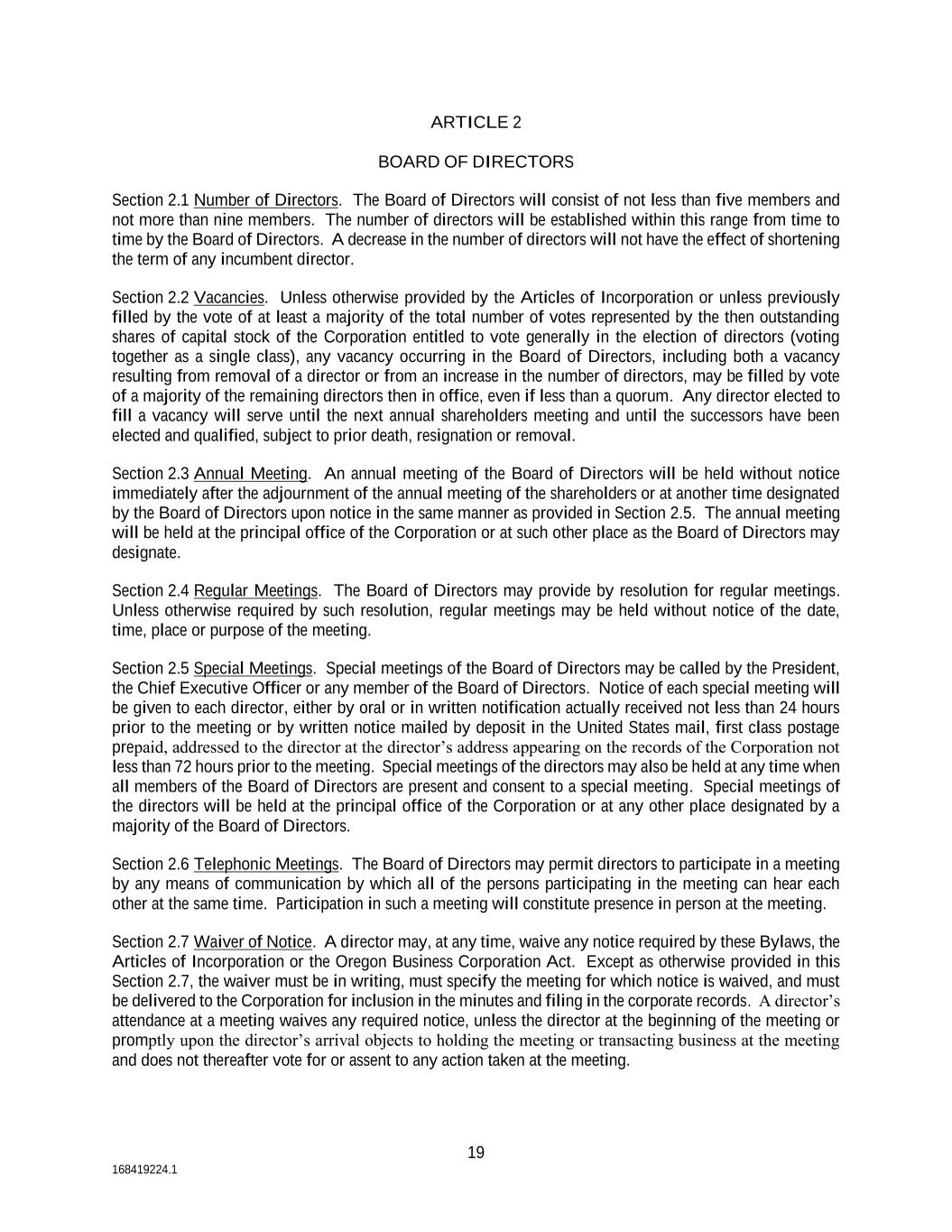
19 168419224.1 ARTICLE 2 BOARD OF DIRECTORS Section 2.1 Number of Directors. The Board of Directors will consist of not less than five members and not more than nine members. The number of directors will be established within this range from time to time by the Board of Directors. A decrease in the number of directors will not have the effect of shortening the term of any incumbent director. Section 2.2 Vacancies. Unless otherwise provided by the Articles of Incorporation or unless previously filled by the vote of at least a majority of the total number of votes represented by the then outstanding shares of capital stock of the Corporation entitled to vote generally in the election of directors (voting together as a single class), any vacancy occurring in the Board of Directors, including both a vacancy resulting from removal of a director or from an increase in the number of directors, may be filled by vote of a majority of the remaining directors then in office, even if less than a quorum. Any director elected to fill a vacancy will serve until the next annual shareholders meeting and until the successors have been elected and qualified, subject to prior death, resignation or removal. Section 2.3 Annual Meeting. An annual meeting of the Board of Directors will be held without notice immediately after the adjournment of the annual meeting of the shareholders or at another time designated by the Board of Directors upon notice in the same manner as provided in Section 2.5. The annual meeting will be held at the principal office of the Corporation or at such other place as the Board of Directors may designate. Section 2.4 Regular Meetings. The Board of Directors may provide by resolution for regular meetings. Unless otherwise required by such resolution, regular meetings may be held without notice of the date, time, place or purpose of the meeting. Section 2.5 Special Meetings. Special meetings of the Board of Directors may be called by the President, the Chief Executive Officer or any member of the Board of Directors. Notice of each special meeting will be given to each director, either by oral or in written notification actually received not less than 24 hours prior to the meeting or by written notice mailed by deposit in the United States mail, first class postage prepaid, addressed to the director at the director’s address appearing on the records of the Corporation not less than 72 hours prior to the meeting. Special meetings of the directors may also be held at any time when all members of the Board of Directors are present and consent to a special meeting. Special meetings of the directors will be held at the principal office of the Corporation or at any other place designated by a majority of the Board of Directors. Section 2.6 Telephonic Meetings. The Board of Directors may permit directors to participate in a meeting by any means of communication by which all of the persons participating in the meeting can hear each other at the same time. Participation in such a meeting will constitute presence in person at the meeting. Section 2.7 Waiver of Notice. A director may, at any time, waive any notice required by these Bylaws, the Articles of Incorporation or the Oregon Business Corporation Act. Except as otherwise provided in this Section 2.7, the waiver must be in writing, must specify the meeting for which notice is waived, and must be delivered to the Corporation for inclusion in the minutes and filing in the corporate records. A director’s attendance at a meeting waives any required notice, unless the director at the beginning of the meeting or promptly upon the director’s arrival objects to holding the meeting or transacting business at the meeting and does not thereafter vote for or assent to any action taken at the meeting.
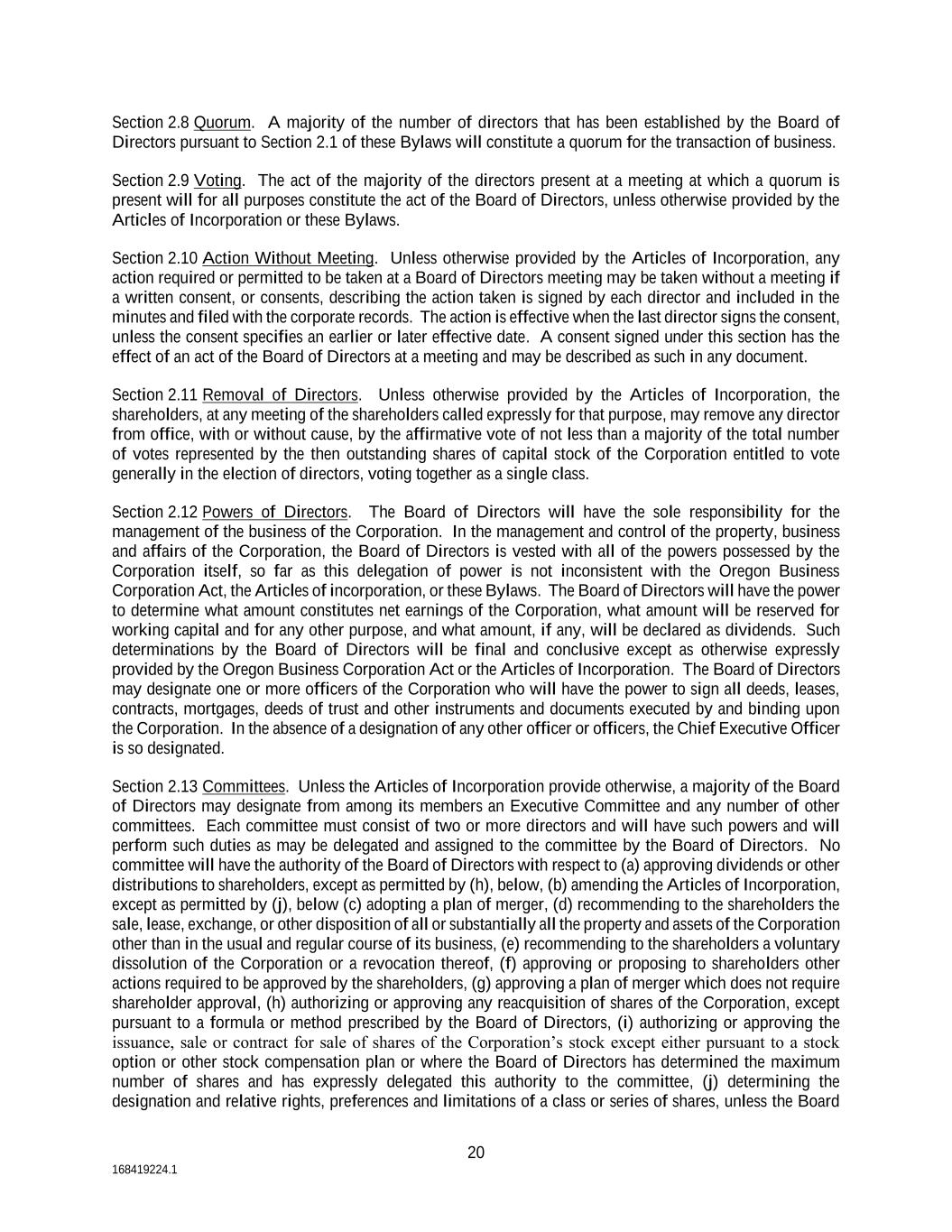
20 168419224.1 Section 2.8 Quorum. A majority of the number of directors that has been established by the Board of Directors pursuant to Section 2.1 of these Bylaws will constitute a quorum for the transaction of business. Section 2.9 Voting. The act of the majority of the directors present at a meeting at which a quorum is present will for all purposes constitute the act of the Board of Directors, unless otherwise provided by the Articles of Incorporation or these Bylaws. Section 2.10 Action Without Meeting. Unless otherwise provided by the Articles of Incorporation, any action required or permitted to be taken at a Board of Directors meeting may be taken without a meeting if a written consent, or consents, describing the action taken is signed by each director and included in the minutes and filed with the corporate records. The action is effective when the last director signs the consent, unless the consent specifies an earlier or later effective date. A consent signed under this section has the effect of an act of the Board of Directors at a meeting and may be described as such in any document. Section 2.11 Removal of Directors. Unless otherwise provided by the Articles of Incorporation, the shareholders, at any meeting of the shareholders called expressly for that purpose, may remove any director from office, with or without cause, by the affirmative vote of not less than a majority of the total number of votes represented by the then outstanding shares of capital stock of the Corporation entitled to vote generally in the election of directors, voting together as a single class. Section 2.12 Powers of Directors. The Board of Directors will have the sole responsibility for the management of the business of the Corporation. In the management and control of the property, business and affairs of the Corporation, the Board of Directors is vested with all of the powers possessed by the Corporation itself, so far as this delegation of power is not inconsistent with the Oregon Business Corporation Act, the Articles of incorporation, or these Bylaws. The Board of Directors will have the power to determine what amount constitutes net earnings of the Corporation, what amount will be reserved for working capital and for any other purpose, and what amount, if any, will be declared as dividends. Such determinations by the Board of Directors will be final and conclusive except as otherwise expressly provided by the Oregon Business Corporation Act or the Articles of Incorporation. The Board of Directors may designate one or more officers of the Corporation who will have the power to sign all deeds, leases, contracts, mortgages, deeds of trust and other instruments and documents executed by and binding upon the Corporation. In the absence of a designation of any other officer or officers, the Chief Executive Officer is so designated. Section 2.13 Committees. Unless the Articles of Incorporation provide otherwise, a majority of the Board of Directors may designate from among its members an Executive Committee and any number of other committees. Each committee must consist of two or more directors and will have such powers and will perform such duties as may be delegated and assigned to the committee by the Board of Directors. No committee will have the authority of the Board of Directors with respect to (a) approving dividends or other distributions to shareholders, except as permitted by (h), below, (b) amending the Articles of Incorporation, except as permitted by (j), below (c) adopting a plan of merger, (d) recommending to the shareholders the sale, lease, exchange, or other disposition of all or substantially all the property and assets of the Corporation other than in the usual and regular course of its business, (e) recommending to the shareholders a voluntary dissolution of the Corporation or a revocation thereof, (f) approving or proposing to shareholders other actions required to be approved by the shareholders, (g) approving a plan of merger which does not require shareholder approval, (h) authorizing or approving any reacquisition of shares of the Corporation, except pursuant to a formula or method prescribed by the Board of Directors, (i) authorizing or approving the issuance, sale or contract for sale of shares of the Corporation’s stock except either pursuant to a stock option or other stock compensation plan or where the Board of Directors has determined the maximum number of shares and has expressly delegated this authority to the committee, (j) determining the designation and relative rights, preferences and limitations of a class or series of shares, unless the Board
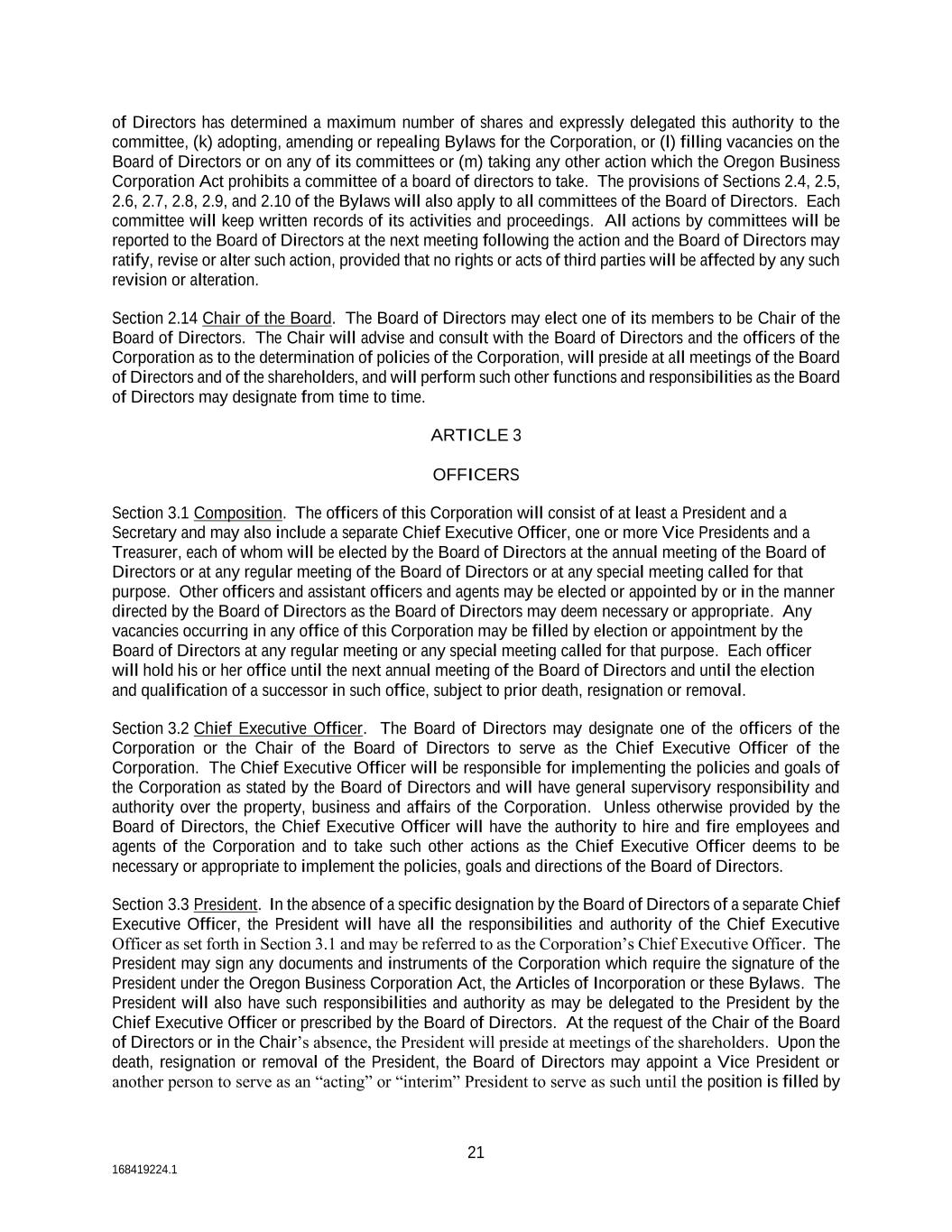
21 168419224.1 of Directors has determined a maximum number of shares and expressly delegated this authority to the committee, (k) adopting, amending or repealing Bylaws for the Corporation, or (l) filling vacancies on the Board of Directors or on any of its committees or (m) taking any other action which the Oregon Business Corporation Act prohibits a committee of a board of directors to take. The provisions of Sections 2.4, 2.5, 2.6, 2.7, 2.8, 2.9, and 2.10 of the Bylaws will also apply to all committees of the Board of Directors. Each committee will keep written records of its activities and proceedings. All actions by committees will be reported to the Board of Directors at the next meeting following the action and the Board of Directors may ratify, revise or alter such action, provided that no rights or acts of third parties will be affected by any such revision or alteration. Section 2.14 Chair of the Board. The Board of Directors may elect one of its members to be Chair of the Board of Directors. The Chair will advise and consult with the Board of Directors and the officers of the Corporation as to the determination of policies of the Corporation, will preside at all meetings of the Board of Directors and of the shareholders, and will perform such other functions and responsibilities as the Board of Directors may designate from time to time. ARTICLE 3 OFFICERS Section 3.1 Composition. The officers of this Corporation will consist of at least a President and a Secretary and may also include a separate Chief Executive Officer, one or more Vice Presidents and a Treasurer, each of whom will be elected by the Board of Directors at the annual meeting of the Board of Directors or at any regular meeting of the Board of Directors or at any special meeting called for that purpose. Other officers and assistant officers and agents may be elected or appointed by or in the manner directed by the Board of Directors as the Board of Directors may deem necessary or appropriate. Any vacancies occurring in any office of this Corporation may be filled by election or appointment by the Board of Directors at any regular meeting or any special meeting called for that purpose. Each officer will hold his or her office until the next annual meeting of the Board of Directors and until the election and qualification of a successor in such office, subject to prior death, resignation or removal. Section 3.2 Chief Executive Officer. The Board of Directors may designate one of the officers of the Corporation or the Chair of the Board of Directors to serve as the Chief Executive Officer of the Corporation. The Chief Executive Officer will be responsible for implementing the policies and goals of the Corporation as stated by the Board of Directors and will have general supervisory responsibility and authority over the property, business and affairs of the Corporation. Unless otherwise provided by the Board of Directors, the Chief Executive Officer will have the authority to hire and fire employees and agents of the Corporation and to take such other actions as the Chief Executive Officer deems to be necessary or appropriate to implement the policies, goals and directions of the Board of Directors. Section 3.3 President. In the absence of a specific designation by the Board of Directors of a separate Chief Executive Officer, the President will have all the responsibilities and authority of the Chief Executive Officer as set forth in Section 3.1 and may be referred to as the Corporation’s Chief Executive Officer. The President may sign any documents and instruments of the Corporation which require the signature of the President under the Oregon Business Corporation Act, the Articles of Incorporation or these Bylaws. The President will also have such responsibilities and authority as may be delegated to the President by the Chief Executive Officer or prescribed by the Board of Directors. At the request of the Chair of the Board of Directors or in the Chair’s absence, the President will preside at meetings of the shareholders. Upon the death, resignation or removal of the President, the Board of Directors may appoint a Vice President or another person to serve as an “acting” or “interim” President to serve as such until the position is filled by
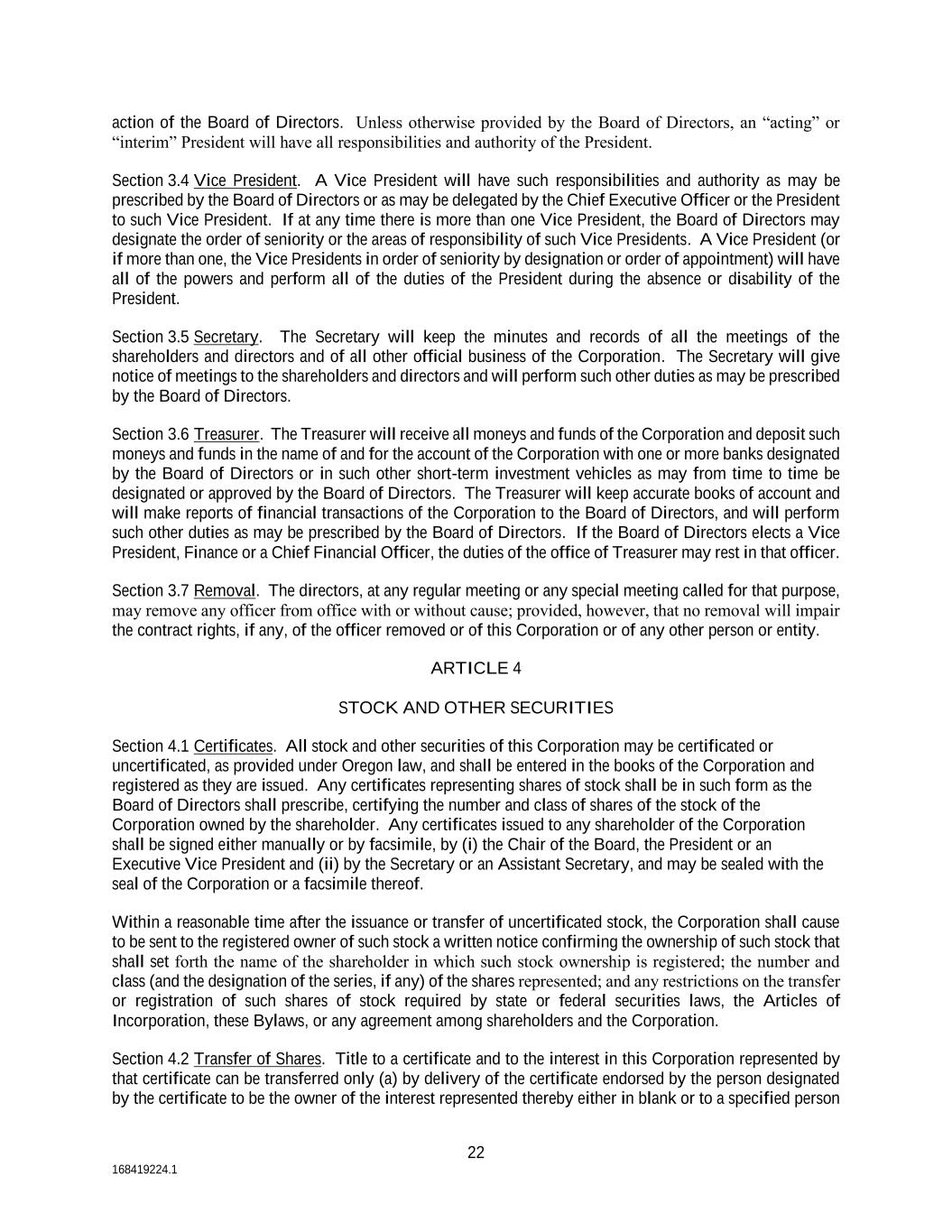
22 168419224.1 action of the Board of Directors. Unless otherwise provided by the Board of Directors, an “acting” or “interim” President will have all responsibilities and authority of the President. Section 3.4 Vice President. A Vice President will have such responsibilities and authority as may be prescribed by the Board of Directors or as may be delegated by the Chief Executive Officer or the President to such Vice President. If at any time there is more than one Vice President, the Board of Directors may designate the order of seniority or the areas of responsibility of such Vice Presidents. A Vice President (or if more than one, the Vice Presidents in order of seniority by designation or order of appointment) will have all of the powers and perform all of the duties of the President during the absence or disability of the President. Section 3.5 Secretary. The Secretary will keep the minutes and records of all the meetings of the shareholders and directors and of all other official business of the Corporation. The Secretary will give notice of meetings to the shareholders and directors and will perform such other duties as may be prescribed by the Board of Directors. Section 3.6 Treasurer. The Treasurer will receive all moneys and funds of the Corporation and deposit such moneys and funds in the name of and for the account of the Corporation with one or more banks designated by the Board of Directors or in such other short-term investment vehicles as may from time to time be designated or approved by the Board of Directors. The Treasurer will keep accurate books of account and will make reports of financial transactions of the Corporation to the Board of Directors, and will perform such other duties as may be prescribed by the Board of Directors. If the Board of Directors elects a Vice President, Finance or a Chief Financial Officer, the duties of the office of Treasurer may rest in that officer. Section 3.7 Removal. The directors, at any regular meeting or any special meeting called for that purpose, may remove any officer from office with or without cause; provided, however, that no removal will impair the contract rights, if any, of the officer removed or of this Corporation or of any other person or entity. ARTICLE 4 STOCK AND OTHER SECURITIES Section 4.1 Certificates. All stock and other securities of this Corporation may be certificated or uncertificated, as provided under Oregon law, and shall be entered in the books of the Corporation and registered as they are issued. Any certificates representing shares of stock shall be in such form as the Board of Directors shall prescribe, certifying the number and class of shares of the stock of the Corporation owned by the shareholder. Any certificates issued to any shareholder of the Corporation shall be signed either manually or by facsimile, by (i) the Chair of the Board, the President or an Executive Vice President and (ii) by the Secretary or an Assistant Secretary, and may be sealed with the seal of the Corporation or a facsimile thereof. Within a reasonable time after the issuance or transfer of uncertificated stock, the Corporation shall cause to be sent to the registered owner of such stock a written notice confirming the ownership of such stock that shall set forth the name of the shareholder in which such stock ownership is registered; the number and class (and the designation of the series, if any) of the shares represented; and any restrictions on the transfer or registration of such shares of stock required by state or federal securities laws, the Articles of Incorporation, these Bylaws, or any agreement among shareholders and the Corporation. Section 4.2 Transfer of Shares. Title to a certificate and to the interest in this Corporation represented by that certificate can be transferred only (a) by delivery of the certificate endorsed by the person designated by the certificate to be the owner of the interest represented thereby either in blank or to a specified person
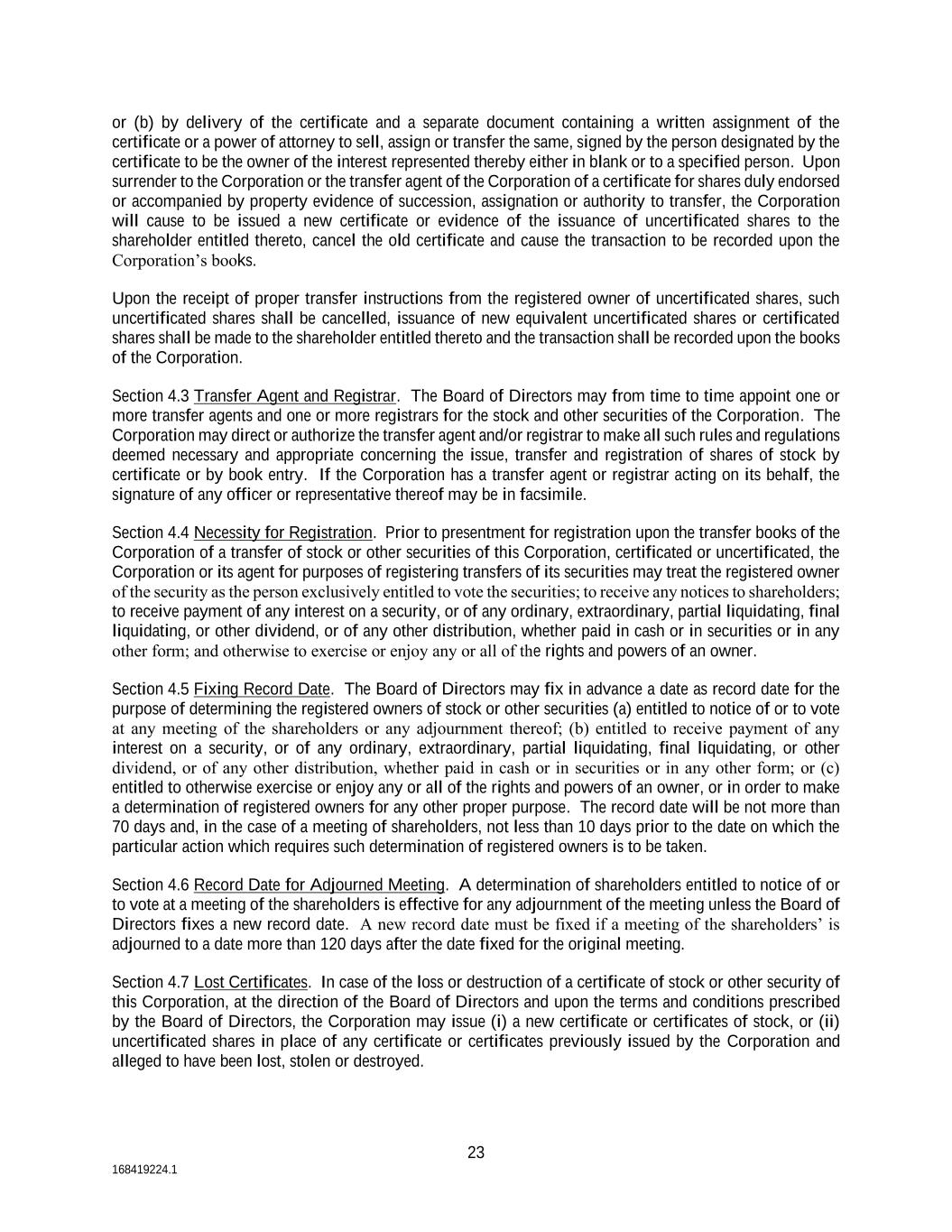
23 168419224.1 or (b) by delivery of the certificate and a separate document containing a written assignment of the certificate or a power of attorney to sell, assign or transfer the same, signed by the person designated by the certificate to be the owner of the interest represented thereby either in blank or to a specified person. Upon surrender to the Corporation or the transfer agent of the Corporation of a certificate for shares duly endorsed or accompanied by property evidence of succession, assignation or authority to transfer, the Corporation will cause to be issued a new certificate or evidence of the issuance of uncertificated shares to the shareholder entitled thereto, cancel the old certificate and cause the transaction to be recorded upon the Corporation’s books. Upon the receipt of proper transfer instructions from the registered owner of uncertificated shares, such uncertificated shares shall be cancelled, issuance of new equivalent uncertificated shares or certificated shares shall be made to the shareholder entitled thereto and the transaction shall be recorded upon the books of the Corporation. Section 4.3 Transfer Agent and Registrar. The Board of Directors may from time to time appoint one or more transfer agents and one or more registrars for the stock and other securities of the Corporation. The Corporation may direct or authorize the transfer agent and/or registrar to make all such rules and regulations deemed necessary and appropriate concerning the issue, transfer and registration of shares of stock by certificate or by book entry. If the Corporation has a transfer agent or registrar acting on its behalf, the signature of any officer or representative thereof may be in facsimile. Section 4.4 Necessity for Registration. Prior to presentment for registration upon the transfer books of the Corporation of a transfer of stock or other securities of this Corporation, certificated or uncertificated, the Corporation or its agent for purposes of registering transfers of its securities may treat the registered owner of the security as the person exclusively entitled to vote the securities; to receive any notices to shareholders; to receive payment of any interest on a security, or of any ordinary, extraordinary, partial liquidating, final liquidating, or other dividend, or of any other distribution, whether paid in cash or in securities or in any other form; and otherwise to exercise or enjoy any or all of the rights and powers of an owner. Section 4.5 Fixing Record Date. The Board of Directors may fix in advance a date as record date for the purpose of determining the registered owners of stock or other securities (a) entitled to notice of or to vote at any meeting of the shareholders or any adjournment thereof; (b) entitled to receive payment of any interest on a security, or of any ordinary, extraordinary, partial liquidating, final liquidating, or other dividend, or of any other distribution, whether paid in cash or in securities or in any other form; or (c) entitled to otherwise exercise or enjoy any or all of the rights and powers of an owner, or in order to make a determination of registered owners for any other proper purpose. The record date will be not more than 70 days and, in the case of a meeting of shareholders, not less than 10 days prior to the date on which the particular action which requires such determination of registered owners is to be taken. Section 4.6 Record Date for Adjourned Meeting. A determination of shareholders entitled to notice of or to vote at a meeting of the shareholders is effective for any adjournment of the meeting unless the Board of Directors fixes a new record date. A new record date must be fixed if a meeting of the shareholders’ is adjourned to a date more than 120 days after the date fixed for the original meeting. Section 4.7 Lost Certificates. In case of the loss or destruction of a certificate of stock or other security of this Corporation, at the direction of the Board of Directors and upon the terms and conditions prescribed by the Board of Directors, the Corporation may issue (i) a new certificate or certificates of stock, or (ii) uncertificated shares in place of any certificate or certificates previously issued by the Corporation and alleged to have been lost, stolen or destroyed.
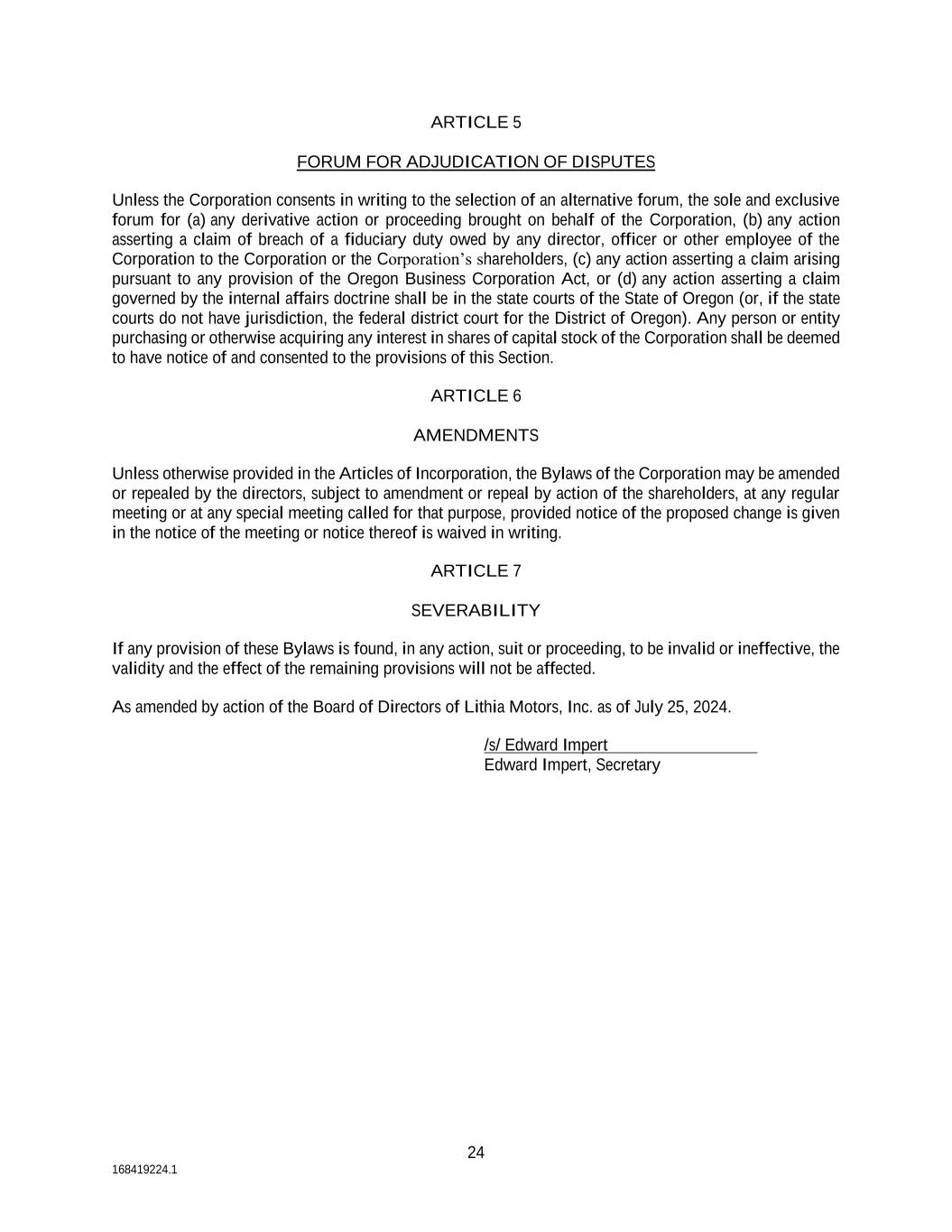
24 168419224.1 ARTICLE 5 FORUM FOR ADJUDICATION OF DISPUTES Unless the Corporation consents in writing to the selection of an alternative forum, the sole and exclusive forum for (a) any derivative action or proceeding brought on behalf of the Corporation, (b) any action asserting a claim of breach of a fiduciary duty owed by any director, officer or other employee of the Corporation to the Corporation or the Corporation’s shareholders, (c) any action asserting a claim arising pursuant to any provision of the Oregon Business Corporation Act, or (d) any action asserting a claim governed by the internal affairs doctrine shall be in the state courts of the State of Oregon (or, if the state courts do not have jurisdiction, the federal district court for the District of Oregon). Any person or entity purchasing or otherwise acquiring any interest in shares of capital stock of the Corporation shall be deemed to have notice of and consented to the provisions of this Section. ARTICLE 6 AMENDMENTS Unless otherwise provided in the Articles of Incorporation, the Bylaws of the Corporation may be amended or repealed by the directors, subject to amendment or repeal by action of the shareholders, at any regular meeting or at any special meeting called for that purpose, provided notice of the proposed change is given in the notice of the meeting or notice thereof is waived in writing. ARTICLE 7 SEVERABILITY If any provision of these Bylaws is found, in any action, suit or proceeding, to be invalid or ineffective, the validity and the effect of the remaining provisions will not be affected. As amended by action of the Board of Directors of Lithia Motors, Inc. as of July 25, 2024. /s/ Edward Impert Edward Impert, Secretary